












Use these tips from Bank of America to help protect your loved ones from the financial threats that increasingly target older Americans.
Suppose you have a parent or grandparent who lives alone. They hire someone to replace the roof on their aging house, providing half the money up front. And that is the last they see of the roofer. Can you be sure they would let you know what happened? Elder fraud is on the rise, but it remains a vastly underreported crime. Older people are often reluctant to report being duped, perhaps out of fear of appearing foolish or losing their independence.
The elderly are uniquely vulnerable to attempts to cheat them. Luckily, providing an appropriate degree of vigilance can help protect those you love. Here are six examples of elder fraud along with strategies you can use to help.
1.P ros who are not legit: Con artists working with older clients often advertise “foolproof” investments. In California, a thief marketed inexpensive will preparation services. After gaining clients’ trust, he talked them into investing with him by promising 12% annual returns. He made off with $11 million before he was caught. What you can do: Remind family members that legitimate businesses will happily wait while they check references. When unsure, it is wise to ask for a second opinion from someone they trust.
2.Unscrupulous billing practices: After natural disasters, scam artists often go door to door, telling homeowners that t heir properties have been damaged and offering to make repairs at a discount. They may only pretend to do the work and then demand payment. Similarly, auto mechanic s may charge for work they never did.
What you can do: Help older relatives keep their properties and cars in good repair and urge them not to hire anyone who cannot provide clear identification and references.
3.I nternet and phone fraud: Thes e s cam artists play on people’s trusting nature and desire to help others. A caller may ask for a donation to a worthysounding cause. Another congratulates you for winning $1 million — and to claim the prize you must provide your Social Security number to confirm your identity and pay a collection fee.
What you can do: Remind older relatives not to give personal information out over the phone, suggests Debra Greenberg, director and product management executive, Investment Solutions Group at Bank of America. Other best practices: “Before making a pledge to a charity, ask to receive something in writing,” Greenberg says. Ignore internet offers with obscure origins and prizes that require a fee to collect.
4.N ot-so-free lunches: Older Americans are often targeted by salespeople offering a free meal in return for listening to a sales pitch. When the pitch becomes a very hard sell, they can find themselves being pulled into a dubious purchase before the “free” meal is over.
What you can do: Make sure that family members know not to sign a contract, make an agreement or pay any money unless a trusted friend or family member is involved.
5 .“ Friends” with ulterior motives: Goo d friends are priceless, but con artists posing as friends can cost you dearly. Someone who lives nearby may offer to assist with chores and errands — and soon may begin “helping” with financial transactions, gaining access to accounts.
What you can do: Try to get your retired parents or grandparents to talk openly about their finances and offer to review checking accounts for signs of trouble. If you see a lot of checks made out to cash or to someone you do not know, consider that a red flag.
Other clues that something is not right include strange signatures on financial or legal documents, sudden, unexplained changes to powers of attorney, wills or trusts, checks bouncing, bills going unpaid and suspicious ATM activity.
One way for family members to get an early warning is through the Merrill Trusted Contact Person Form, notes Cynthia Hutchins, director of Financial Gerontology at Bank of America. “It authorizes an advisor to reach out to a family member or trusted family friend if they spot unusual financial activity,” she says.
6 .Family fraud: Perhaps the most distressing form of fraud involves family members. Problems may start innocently, when a son or daughter gains control of a parent’s accounts to help pay bills. After a while, the line between the finances of the parent and the child may become blurred, and the temptation to dip into the funds becomes irresistible.
What you can do: If one sibling helps with a parent’s finances, build transparency into the process, with other family members staying involved through regular conversations. You might also ask your financial advisor to set up a family meeting to discuss financial concerns.
In all of these cases, the best offense is usually a good defense. Criminals look for the path of least resistance. If you make it clear you will not be fooled, chances are they will move on.
For more information, contact Merrill Financial Advisor Andrew Neal in the Greenwood Village, CO, office at 303.689.8043 or andrew.neal@ml.com.
Investing involves risk. There is always the potential of losing money when you invest in securities. Asset allocation, diversification, and rebalancing do not ensure a profit or protect against loss in declining markets. This material does not take into account a client’s particular investment objectives, financial situations, or needs and is not intended as a recommendation, offer, or solicitation for the purchase or sale of any security or investment strategy. Merrill offers a broad range of brokerage, investment advisory (including financial planning) and other services. There are important differences between brokerage and investment advisory services, including the type of advice and assistance provided, the fees charged, and the rights and obligations of the parties. It is important to understand the differences, particularly when determining which service or services to select. For more information about these services and their differences, speak with your Merrill Lynch Wealth Management Advisor. Banking products are provided by Bank of America, N.A., member FDIC, and a wholly owned subsidiary of Bank of America Corporation (“BofA Corp.”) Bank of America, N.A. makes available The H.S.A. for Life® Health Savings Account.
Bank of America is a marketing name for the Retirement Services business of Bank of America Corporation (“BofA Corp”). Banking activities may be performed by wholly owned banking affiliates of BofA Corp., including Bank of America N.A., member FDIC. Please consult your tax or legal advisor regarding specific use of Health Savings Accounts. Investments can lose money. Neither Bank of America nor any of its affiliates provide legal, tax or accounting advice. You should consult your legal and/or tax advisors before making any financial decisions. Merrill Lynch, Pierce, Fenner & Smith Incorporated (also referred to as “MLPF&S” or “Merrill”) makes available certain investment products sponsored, managed, distributed or provided by companies that are affiliates of Bank of America Corporation (“BofA Corp.”). MLPF&S is a registered broker-dealer, registered investment adviser, Member SIPC and a wholly owned subsidiary of BofA Corp.
Brokerage services are provided by Merrill Lynch, Pierce, Fenner & Smith Incorporated, a registered broker-dealer, registered investment adviser, Member SIPC, and a wholly owned subsidiary of Bank of America Corporation.
Banking products such as checking accounts and certificates of deposit are FDIC insured to the maximum allowed by law and are offered through Bank of America, N.A., Member FDIC. Investment products offered through MLPF&S, and insurance and annuity
A message from Mayor Mike Coffman’s Office
There were thousands of people who attended the rally today, some of whom might have visited Aurora for the first time, who were able to see firsthand the mischaracterizations of our great community. I am disappointed that the former president did not get to experience more of our city for himself.
I cannot overstate enough that nothing was said today that has not been said before and for which the city has not responded with the facts. Again, the reality is that the concerns about Venezuelan gang activity in our city – and our state – have been grossly exaggerated and have unfairly hurt the city’s identity and sense of safety. The city and state have not been “taken over” or “invaded” or “occupied” by migrant gangs. The incidents that have occurred in Aurora, a city of 400,000 people, have been limited to a handful of specific apartment complexes, and our dedicated police officers have acted on those concerns and will continue to do so.
Ryan S. Luby
Deputy Director Communications and Marketing Department, City of Aurora

The Centennial Institute at Colorado Christian University welcomed 275 distinguished guests to the CCU campus on Thursday, October 3, 2024, for the presentation of the Eighth Annual William L. Armstrong Award to Robert L. Woodson, founder and president of the Woodson Center in Washington, D.C.
The William L. Armstrong Award is presented annually in honor of the late businessman, United States senator (1979-1991), and Colorado Christian University president (2006-2016) William L.
Armstrong. The award is given to a leader who embodies the values that Armstrong held dear – faith, family, and freedom – and who has made a difference in America’s culture through business, politics or education. The prestigious award has been an annual highlight, the University’s highest honor, presented each year since Armstrong’s death in 2016.
“It was an honor to join with others to honor the legacy of Bill Armstrong and the visionary things he accomplished for our conservative values and for this university,”
said Eric K. Hogue, CCU President. “As part of that legacy, Colorado Christian University and the Centennial Institute are honored to present the William L. Armstrong Award to Bob Woodson – an inspiring leader who continues to work directly with communities to combat real-world issues.”
“Bob Woodson was a hero to my father,” said Wil Armstrong, son of the late senator and chairman of the Board of Trustees of Colorado Christian University.
“He particularly appreciated Bob’s effectiveness in calling at-
tention to and examining the work of heroes who make a difference in our cities. In a time of racial divisions and tensions, Bob has set a higher standard and become a role model to generations.”
Woodson maintained a lifelong friendship with Armstrong, later serving on the Board of Trustees of Colorado Christian University. The University awarded him an honorary doctorate of humanities in 2010.
“This award is a great honor, partly because Colorado Christian University has a special place in my heart, and also because Senator Armstrong was such a good friend to me, and to the Woodson Center,” said Woodson. “We spent many years working together to help people lift themselves out of poverty, to minimize the focus on race and maximize the focus on opportunity and freedom. To see that work honored in this way means a great deal to me.”
To learn more about the William L. Armstrong Award and past recipients, please visit: https://www.thearmstrongproject. org/award/.










Colorado Government Seeks Ballot Decisions
By now most Colorado voters have received their 2024 election ballots. This week legal Colorado newspapers in each county are printing the statewide ballot measures (see pages 6-13 in this issue.) All Colorado voters should have also received the 2024 State Ballot information booklet. Legal newspapers across the state have historically been the source of informing voters of new laws proposed by the legislature along with new citizen initiatives.
five statutory changes came from citizen-initiated petitions.
You may, or may not, have time to read the “Blue Book” that goes into extensive detail about the measures.

This year there are a record number of statewide questions for voters.
BY BOB SWEENEY PUBLISHER
This year there are 14 statewide ballot measures, seven of which are proposed changes to the state constitution that require a 55% voter approval. The other seven are changes to state law that require the approval of a simple majority. Along with the five legislature-proposed constitutional amendments, there are two citizen signature-proposed constitutional amendments. The legislature also proposed two changes to state statutes, while
There is an old rule I have followed for many years that is very simple. If it appears too complex or complicated, or if the legislature can’t figure it out, just vote “No.” That maintains the status quo that we live with daily. It has been suggested by wise folks that every time a new law is passed an old law needs to be repealed.
A short analysis of the measures appears on page 14 in this newspaper with some details on the questions. I’ve provide my brief opinion on the measures here. You may or may not agree; there are many different opinions on some of these ballots.
The Villager will go into local ballot measures that just impact county and city voters next week.
Amendment G: Let’s support our disabled veterans. Yes.
Amendment H: Leave judges alone, don’t need another board: No.
Amendment I: Support the judge’s decisions. Yes.
Amendment J: U.S. Supreme Court ruled law of the land.
Amendment K: O.K. to support election workload deadline. Yes.
Amendment 79: Colorado is abortion legal state already.
Amendment 80: Puts school choice in constitution. No.
Aurora City Council Member Danielle Jurinsky introduced a proposal approved by the City Council 6-2 on Monday that authorizes the Aurora City Attorney’s Office to submit a series of Colorado Open Records Act (CORA) requests to the Governor’s Office, the Colorado Office of New Americans, the Mayor’s Office for the City and County of Denver, and the Denver Pathways to the Integration of New Americans for any emails and contracts related to providing assistance to immigrants in order to relocate them to the city of Aurora.
“I believe that Governor Polis and Denver Mayor Mike Johnston conspired to sneak potentially
thousands of migrants into our city, using several nonprofits in the metro, that ultimately put the safety of our citizens at risk,” said Jurinsky.
Aurora gained national media attention after a video went viral showing armed men inside an Aurora apartment building in the 1200 block of Dallas Street appearing to break into apartment units. The video was recorded minutes before a shooting occurred outside the building on Aug. 18.
At this time, none of the six suspects have been connected to any criminal organization. However, that piece of the investigation is ongoing. Operation Safe
Haven investigators are actively searching for the wanted suspects with the assistance of local, state, and federal law enforcement partners, and they are working to determine and confirm if the suspects have a connection to Venezuelan prison gang Tren de Aragua (TdA).
“I think that it’s incredibly insulting to think that Governor Polis and Mayor Mike Johnston could covertly push migrants into our city without even having the courtesy to warn us about what they were doing,” said Jurinsky.
Jurinsky said she hopes the CORA requests will help the people of Aurora and the city understand how many migrants

Proposition JJ: Let the state keep all the betting funds. Yes.
Proposition KK: Taxes infringe on second amendment: No.
Proposition 127: Changes in CO. Game Management. No.
Proposition 128: Changes in conviction sentences. No.
Proposition 129: New concept for pet care proposal. No.
Proposition 130: $350 million/ no funds appropriated. No.
Proposition 131: Only the rich will win, support 2 parties. No.
were sent to Aurora, what promises were made to the migrants in terms of support, and whether the migrants were vetted to intentionally send those with criminal backgrounds and/or gang affiliations to Aurora.
Jurinsky first learned of the migrant relocation effort from reading an article that appeared in the City Journal at https:// www.city-journal.org/article/ chaos-in-aurora entitled “Chaos in Aurora.”
“We need to know what Governor Polis and Mayor Johnston did to our city so that we fully understand the magnitude of the challenges that we are facing in the short run and in the long run, and protect our city from this ever happening again,” said Jurinsky.
gerri@villagerpublishing.com
PUBLISHER Robert Sweeney bsween1@aol.com
CREATIVE MARKETING DIRECTOR Susan Sweeney Lanam 720-270-2018 susan@villagerpublishing.com
VICE PRESIDENT/MARKETING Sharon Sweeney sharon@villagerpublishing.com LEGALS
GOVERNMENTAL REPORTER Freda Miklin fmiklin.villager@gmail.com 303-489-4900
REPORTER Robert Sweeney bsween1@aol.com
FASHION & LIFESTYLE Scottie Iverson swan@denverswan.com
DESIGN/PRODUCTION MANAGER Tom McTighe production@villagerpublishing.com
ADVERTISING CONSULTANTS Susan Lanam — 720-270-2018 susan@villagerpublishing.com
Sharon Sweeney — 303-503-1388 Gerri Sweeney — 720-313-9751 gerri@villagerpublishing.com
Scottie Iverson swan@denverswan.com
SUBSCRIPTIONS Gerri 303-773-8313
EDITORIAL COLUMNIST Robert Sweeney bsween1@aol.com
www.fasbank.com 303-694-6464 “Our


www.epicureangroupco.com 303-770-0877


Carrie Warren-Gully has earned the right to a second four-year term as Arapahoe County Commissioner District One. Current board chair, she has also served on the budget committee and held dozens of town halls to get input from her constituents. Carrie works hard and gets along well with everyone she encounters. She is focused on her community and its future, including the environment and the needs of senior
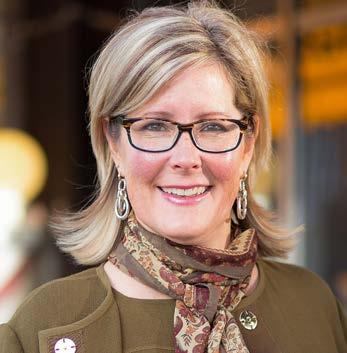

citizens, soon to be the county’s largest demographic. Groups from Aurora Firefighters to Colorado Construction & Building Trades Council to Conservation Colorado have endorsed her. This newspaper does, as well.
Jeff Baker has earned the respect and admiration of his partners in the

eight years he has served as Arapahoe County Commissioner District Three. A military veteran who was deployed in support of Operation Desert Shield/ Desert Storm and former CSI supervisor for the Aurora Police Department, Jeff worked for Arapahoe County for 18 years before being elected. During his tenure as a county commissioner, Jeff, has become a recognized expert in the field of oil and gas development and production in eastern Arapahoe County. He also served as chair of the BOCC in 2018 and 2019. It would be hard to find someone who knows more about the county than Jeff Baker. He deserves a third term.
Rhonda Fields brings vast experience as a community leader to her campaign to become Arapahoe County Commissioner District Five, having served six years in the state House and seven years in the state Senate, where she was highly respected for her work ethic and dedication to her community.

As a commissioner, Rhonda has named public safety, advocating for an aging population, making sure our veterans and our youth receive the services they need, and strategic economic development as priorities she will pursue. A proven leader, we believe Rhonda Fields will be a strong addition to the Arapahoe County Board of County Commissioners.
Elevate your senior living experience at St. Andrew's Village, where personalized service and care meets inspired living. Unwind in our chic apartment homes and immerse yourself in a community that goes beyond the ordinary. From engaging on-site activities and events to resort-style amenities, we prioritize your comfort by offering all essential services, activities and care in one centralized location.
At St. Andrew's Village, we redefine senior living, creating a haven where every moment is tailored to enhance your well-being, allowing you to live life on your terms.

The Colorado Constitution (Article V, Section 1(7.3)) requires the Colorado Legislative Council to publish the ballot title and legal text of each statewide ballot measure. A “YES/FOR” vote on any ballot issue is a vote in favor of changing current law or existing circumstances, and a “NO/AGAINST” vote on any ballot issue is a vote against changing current law or existing circumstances.
Amendment G
Modify Property Tax Exemption for Veterans with Disabilities
The ballot title below is a summary drafted by the professional legal staff for the general assembly for ballot purposes only. The ballot title will not appear in the Colorado constitution. The text of the measure that will appear in the Colorado constitution below was referred to the voters because it passed by a two-thirds majority vote of the state senate and the state house of representatives.
Ballot Title:
Shall there be an amendment to the Colorado constitution concerning the expansion of eligibility for the property tax exemption for veterans with a disability to include a veteran who does not have a service-connected disability rated as a one hundred percent permanent disability but does have individual unemployability status?
Text of Measure:
Be It Resolved by the House of Representatives of the Seventy-fourth General Assembly of the State of Colorado, the Senate concurring herein:
SECTION 1. At the election held on November 5, 2024, the secretary of state shall submit to the registered electors of the state the ballot title set forth in section 2 for the following amendment to the state constitution:
In the constitution of the state of Colorado, section 3.5 of article X, amend (1)(c) and (1.5) as follows:
Section 3.5. Homestead exemption for qualifying senior citizens, veterans with a disability, and surviving spouses receiving dependency indemnity compensation - definition. (1) For property tax years commencing on or after January 1, 2002, fifty percent of the first two hundred thousand dollars of actual value of residential real property, as defined by law, that, as of the assessment date, is owner-occupied and is used as the primary residence of the owner-occupier shall be exempt from property taxation if: (c) For property tax years commencing on or after January 1, 2007, only, the owneroccupier, as of the assessment date, is a disabled veteran with a disability. (1.5) For purposes of this section, “disabled veteran” “veteran with a disability” means an individual who has served on active duty in the United States armed forces, including a member of the Colorado national guard who has been ordered into the active military service of the United States, has been separated therefrom under honorable conditions, and either has established a service-connected disability that has been rated by the federal United States department of veterans affairs as one hundred percent permanent disability through disability retirement benefits or a pension pursuant to a law or regulation administered by the department, the department of homeland security, or the department of the army, navy, or air force or has individual unemployability status as determined by the United States department of veterans affairs.
SECTION 2. Each elector voting at the election may cast a vote either “Yes/For” or “No/ Against” on the following ballot title: “Shall there be an amendment to the Colorado constitution concerning the expansion of eligibility for the property tax exemption for veterans with a disability to include a veteran who does not have a service-connected disability rated as a one hundred percent permanent disability but does have individual unemployability status?”
SECTION 3. Except as otherwise provided in section 1-40-123, Colorado Revised Statutes, if at least fifty-five percent of the electors voting on the ballot title vote “Yes/For”, then the amendment will become part of the state constitution. Amendment H Judicial Discipline Procedures and Confidentiality
The ballot title below is a summary drafted by the professional legal staff for the general assembly for ballot purposes only. The ballot title will not appear in the Colorado constitution. The text of the measure that will appear in the Colorado constitution below was referred to the voters because it passed by a two-thirds majority vote of the state senate and the state house of representatives.
Ballot Title: Shall there be an amendment to the Colorado constitution concerning judicial discipline, and, in connection therewith, establishing an independent judicial discipline adjudicative board, setting standards for judicial review of a discipline case, and clarifying when discipline proceedings become public?
Text of Measure:
Be It Resolved by the House of Representatives of the Seventy-fourth General Assembly of the State of Colorado, the Senate concurring herein:
SECTION 1. At the election held on November 5, 2024, the secretary of state shall submit to the registered electors of the state the ballot title set forth in section 2 for the following amendment to the state constitution: In the constitution of the state of Colorado, section 23 of article VI, amend (3)(a), (3)(e), (3) (f), (3)(g), and (3)(h); and add (3)(c.5) and (3)(k) as follows: Section 23. Retirement and removal of justices and judges. (3) (a) There shall be a commission on judicial discipline. It shall consist of: Two judges of district courts and two judges of county courts, each selected by the supreme court, as provided by law; two citizens admitted to practice law in the courts of this state, neither of whom shall be a justice or judge, who shall have practiced in this state for at least ten years and who shall be appointed by the governor, with the consent of the senate; and four citizens, none of whom shall be a justice or judge, active or retired, nor admitted to practice law in the courts of this state, who shall be appointed by the governor, with the consent of the senate. An appointing authority shall not appoint a member of the independent judicial discipline adjudicative board established in subsection (3)(c.5) of this section to the commission.
(c.5) (I) There is created the independent judicial discipline adjudicative board as an independent agency within the judicial department. The adjudicative board shall conduct formal judicial disciplinary proceedings. The adjudicative board also shall hear appeals of the commission’s orders of informal remedial action. Appeals to the adjudicative board are confidential. The adjudicative board consists of four district court judges without any judicial or attorney disciplinary history, appointed by the supreme court; four attorneys without any judicial or attorney disciplinary history who are licensed to practice law in Colorado and who reside in Colorado, appointed by the governor and confirmed by the senate; and four citizens who are not judges or attorneys licensed to practice law in Colorado, appointed by the governor and confirmed by the senate. An appointing authority shall not appoint a member of the commission to the adjudicative board. For the purpose of staggering terms, when making the initial appointments to the adjudicative board, the appointing authority shall designate two members from each category to a five-year term and two members from each category to a three-year term. All subsequent appointments are for a term of five years; except that in the event of a vacancy on the adjudicative board, the original appointing authority shall appoint, in the same manner as an original appointment, a replacement to serve the remainder of the term. (II) Upon order of a formal hearing pursuant to subsection (3)(e) of this section, a panel of the adjudicative board shall convene to conduct the hearing. A panel consists of one judge, one attorney licensed to practice law in Colorado, and one citizen. The state court administrator, or the administrator’s designee, shall randomly select the panel from among the adjudicative board’s membership. The random selection of a panel is a purely administrative function. (e) (I) The commission may, after such investigation as it deems necessary, dismiss a
complaint, order informal remedial action, or order a formal hearing to be held before it a panel of the adjudicative board concerning the removal, retirement, suspension, censure, reprimand, or other discipline of a justice or a judge. or request the supreme court to appoint three special masters, who shall be justices or judges of courts of record, to hear and take evidence in any such matter and to report thereon to the commission. The respondent justice or judge may appeal the commission’s order for informal remedial action to a panel of the adjudicative board. The adjudicative panel shall review the commission’s informal remedial action order for abuse of discretion. An appeal of an informal remedial action order is confidential consistent with subsection (3)(g) of this section.
(II) After a formal hearing, or after considering the record and report of the masters, if the commission finds good cause therefor, it the adjudicative panel may dismiss the charges before it; take informal remedial action; or it may recommend to the supreme court order the removal, retirement, suspension, censure, reprimand, or other discipline, as the case may be, of the justice or judge. The commission adjudicative panel may also recommend order that the costs of its the investigation and hearing be assessed against such justice or judge. The justice or judge may appeal an adjudicative panel’s disciplinary order, and the commission may appeal an adjudicative panel’s dismissal or disciplinary order, to the supreme court or, when the circumstances described in subsection (3)(f)(II) of this section are present, to the tribunal described in subsection (3)(f)(II) of this section.
(f) (I) Following receipt of a recommendation from the commission, the supreme court shall review the record of the proceedings on the law and facts and in its discretion may permit the introduction of additional evidence and shall order On appeal of an adjudicative panel’s order for removal, retirement, suspension, censure, reprimand, or other discipline, as it finds just and proper, or wholly reject the recommendation or a panel’s dismissal of charges, the supreme court, or the tribunal described in subsection (3)(f)(II) of this section if the tribunal is hearing the appeal, shall review the record of the proceedings on the law and facts. When reviewing the adjudicative panel’s decision, the supreme court shall review matters of law de novo, review factual matters to determine whether the adjudicative panel’s determination is clearly erroneous, and review any sanctions imposed by the adjudicative panel for abuse of discretion. Upon an order for retirement, the justice or judge shall thereby be retired with the same rights and privileges as if he retired pursuant to statute. Upon an order for removal, the justice or judge shall thereby be removed from office, and his salary shall cease from the date of such order. On the entry of an order for retirement or for removal of a judge, his office shall be deemed vacant.
(II) In proceedings in which the circumstances described in this subsection (3)(f) (II) are present, a tribunal comprised of seven judges of the court of appeals and district court shall review the decision of the adjudicative panel or hear any other appeal in the same manner and use the same standards of review as the supreme court when it reviews decisions and hears appeals as described in subsection (3)(f)(I) of this section. The state court administrator, or the administrator’s designee, shall randomly select members of the tribunal from among all district judges and court of appeals judges who do not have a current disciplinary investigation or proceeding pending before the commission or adjudicative board; have not received a disciplinary sanction from the commission, adjudicative board, or supreme court; and are not otherwise required by law, court rule, or judicial canon to recuse themselves from the tribunal. A tribunal must not include more than one member who is a court of appeals judge and not more than one district judge from any one judicial district. The random selection of tribunal members is a purely administrative function. The tribunal shall review decisions and hear any other appeals in the following circumstances:
(A) When the proceedings involve a complaint against a Colorado supreme court justice;
(B) When a Colorado supreme court justice is a complainant or a material witness in the proceeding;
(C) When a staff member to a Colorado supreme court justice is a complainant or material witness in the proceeding;
(D) When a family member of a Colorado supreme court justice is a complainant or material witness in the proceeding; or
(E) When any other circumstances exist due to which more than two Colorado supreme court justices have recused themselves from the proceeding.
(III) Upon a determination that a sanction imposed by the adjudicative panel is an abuse of discretion, the supreme court or, if applicable, the tribunal, shall remand the proceedings to the panel that imposed the sanction with directions the court or tribunal deems necessary.
(IV) Upon an order for retirement, the justice or judge is retired with the same rights and privileges as if the justice or judge retired pursuant to statute.
Upon an order for removal, the justice or judge is removed from office and the justice’s or judge’s salary ceases from the date of the order. On the entry of an order for retirement or for removal of a justice or judge, the justice’s or judge’s office is deemed vacant.
(g) (I) Prior to the filing of a recommendation to the supreme court by the commission commencement of formal disciplinary proceedings against any justice or judge, all papers filed with and proceedings before the commission on judicial discipline or masters appointed by the supreme court, pursuant to this subsection (3), shall be are confidential, and the filing of papers with and the giving of testimony before the commission or the masters shall be privileged; but no other publication of such papers or proceedings shall be privileged in any action for defamation; except that the record filed by the commission in the supreme court continues privileged is confidential. A person is absolutely immune from any action for defamation based on papers filed with or testimony before the commission, the adjudicative board, the supreme court, or the tribunal, but no other publication of the papers or proceedings has absolute immunity in any action for defamation and a writing which that was privileged prior to its filing with the commission or the masters does not lose such privilege by such filing.
(II) Notwithstanding the confidentiality requirement described in this subsection (3)(g), the commission may:
(A) Release information about the status of an evaluation, investigation, or proceeding to the victim of misconduct or the complainant;
(B) Release information about a complaint that resulted in informal remedial action or public discipline of a judge or justice to the state court administrator as necessary for the selection of a tribunal pursuant to subsection (3)(f)(II) of this section; any relevant commission on judicial performance or judicial nominating commission, the office of attorney regulation counsel, and the office of the presiding disciplinary judge, or successors to each commission or office; the office of the governor, for the purpose of judicial appointments; the judicial department, for the purpose of reviewing applicants for the senior judge program and appointments to the adjudicative board pursuant to subsection (3)(c.5)(I) of this section; and other limited recipients consistent with the purposes of this section allowed by rule; and
(C) Make publicly available aggregate information about trends or patterns in complaints made to the commission, but the commission shall not make public any information that identifies any specific person or complaint.
(III) A recipient of confidential information pursuant to subsection (3)(g)(II)(B) of this section shall preserve the confidentiality of the information subject to any sanctions for violation of confidentiality as may be provided by law.
(IV) The general assembly may provide by law for confidential reporting and complainant rights consistent with subsection (3)(g)(II) of this section.
(h) The supreme court shall by rule provide for procedures before the commission on
Continued next page
Continued from previous page
judicial discipline, the masters, and the supreme court. The rules shall also provide the standards and degree of proof to be applied by the commission in its proceedings. A justice or judge who is a member of the commission commission, adjudicative board, tribunal, or supreme court shall not participate in any proceedings involving his the justice’s or judge’s own removal or retirement.
(k) (I) There is created a rule-making committee to adopt rules for the judicial discipline process. The rule-making committee consists of four members appointed by the supreme court; four members appointed by the adjudicative board; four members appointed by the commission; and one victim’s advocate, as defined in law, appointed by the governor. Members serve at the pleasure of their appointing authority. The rule-making committee shall elect a chair who is a member of the committee. The rules must include the standards and degree of proof to be applied in judicial discipline proceedings; confidential reporting procedures; and complainant rights during the evaluation, investigation, and hearing process. The general assembly may provide by law for confidential reporting and complainant rights.
(II) The rule-making committee may promulgate specific rules governing proceedings before a panel of the adjudicative board. The Colorado rules of evidence and Colorado rules of civil procedure, as amended, apply to proceedings before a panel of the adjudicative board until and unless the rule-making committee promulgates rules governing panel proceedings. Rules promulgated pursuant to this subsection (3)(k)(II) apply to formal proceedings initiated on or after April 1, 2025.
SECTION 2. Each elector voting at the election may cast a vote either “Yes/For” or “No/ Against” on the following ballot title: “Shall there be an amendment to the Colorado constitution concerning judicial discipline, and, in connection therewith, establishing an independent judicial discipline adjudicative board, setting standards for judicial review of a discipline case, and clarifying when discipline proceedings become public?”.
SECTION 3. Except as otherwise provided in section 1-40-123, Colorado Revised Statutes, if at least fifty-five percent of the electors voting on the ballot title vote “Yes/For”, then the amendment will become part of the state constitution. Amendment I Constitutional Bail Exception for First Degree Murder
The ballot title below is a summary drafted by the professional legal staff for the general assembly for ballot purposes only. The ballot title will not appear in the Colorado constitution. The text of the measure that will appear in the Colorado constitution below was referred to the voters because it passed by a two-thirds majority vote of the state senate and the state house of representatives.
Ballot Title:
Shall there be an amendment to the Colorado constitution concerning creating an exception to the right to bail for cases of murder in the first degree when proof is evident or presumption is great?
Text of Measure:
Be It Resolved by the House of Representatives of the Seventy-fourth General Assembly of the State of Colorado, the Senate concurring herein:
SECTION 1. At the election held on November 5, 2024, the secretary of state shall submit to the registered electors of the state the ballot title set forth in section 2 for the following amendment to the state constitution:
In the constitution of the state of Colorado, section 19 of article II, amend (2); and add (1) (d) as follows:
Section 19. Right to bail - exceptions. (1) All persons shall be bailable by sufficient sureties pending disposition of charges except: (d) For the offense of murder in the first degree, as defined by law, committed on or after the effective date of this subsection (1)(d), when proof is evident or presumption is great.
(2) Except in the case of a capital offense or murder in the first degree, if a person is denied bail under this section, the trial of the person shall be commenced not more than ninety days after the date on which bail is denied. If the trial is not commenced within ninety days and the delay is not attributable to the defense, the court shall immediately schedule a bail hearing and shall set the amount of the bail for the person.
SECTION 2. Each elector voting at the election may cast a vote either “Yes/For” or “No/ Against” on the following ballot title: “Shall there be an amendment to the Colorado constitution concerning creating an exception to the right to bail for cases of murder in the first degree when proof is evident or presumption is great?”
SECTION 3. Except as otherwise provided in section 1-40-123, Colorado Revised Statutes, if at least fifty-five percent of the electors voting on the ballot title vote “Yes/For”, then the amendment will become part of the state constitution. Amendment J
Repealing the Definition of Marriage in the Constitution
The ballot title below is a summary drafted by the professional legal staff for the general assembly for ballot purposes only. The ballot title will not appear in the Colorado constitution. The text of the measure that will appear in the Colorado constitution below was referred to the voters because it passed by a two-thirds majority vote of the state senate and the state house of representatives.
Ballot Title:
Shall there be an amendment to the Colorado constitution removing the ban on same-sex marriage?
Text of Measure:
Be It Resolved by the Senate of the Seventy-fourth General Assembly of the State of Colorado, the House of Representatives concurring herein:
SECTION 1. At the election held on November 5, 2024, the secretary of state shall submit to the registered electors of the state the ballot title set forth in section 2 for the following amendment to the state constitution: In the constitution of the state of Colorado, repeal section 31 of article II as follows:
Section 31. Marriages - valid or recognized. Only a union of one man and one woman shall be valid or recognized as a marriage in this state.
SECTION 2. Each elector voting at the election may cast a vote either “Yes/For” or “No/ Against” on the following ballot title: “Shall there be an amendment to the Colorado constitution removing the ban on same-sex marriage?”
SECTION 3. Except as otherwise provided in section 1-40-123, Colorado Revised Statutes, if a majority of the electors voting on the ballot title vote “Yes/For”, then the amendment will become part of the state constitution. Amendment K Modify Constitutional Election Deadlines
The ballot title below is a summary drafted by the professional legal staff for the general assembly for ballot purposes only. The ballot title will not appear in the Colorado constitution. The text of the measure that will appear in the Colorado constitution below was referred to the voters because it passed by a two-thirds majority vote of the state senate and the state house of representatives.
Ballot Title:
Shall there be an amendment to the Colorado constitution concerning the modification of certain deadlines in connection with specified elections?
Text of Measure:
Be It Resolved by the Senate of the Seventy-fourth General Assembly of the State of Colorado, the House of Representatives concurring herein:
SECTION 1. At the election held on November 5, 2024, the secretary of state shall submit to the registered electors of the state the ballot title set forth in section 2 for the following amendments to the state constitution:
In the constitution of the state of Colorado, section 1 of article V, amend (2), (3), and (7.3) as follows: Section 1. General assembly - initiative and referendum. (2) The first power hereby reserved by the people is the initiative, and signatures by registered electors in an amount
equal to at least five percent of the total number of votes cast for all candidates for the office of secretary of state at the previous general election shall be required to propose any measure by petition, and every such petition shall include the full text of the measure so proposed. Initiative petitions for state legislation and amendments to the constitution, in such form as may be prescribed pursuant to law, shall be addressed to and filed with the secretary of state at least three months and one week before the general election at which they are to be voted upon.
(3) The second power hereby reserved is the referendum, and it may be ordered, except as to laws necessary for the immediate preservation of the public peace, health, or safety, and appropriations for the support and maintenance of the departments of state and state institutions, against any act or item, section, or part of any act of the general assembly, either by a petition signed by registered electors in an amount equal to at least five percent of the total number of votes cast for all candidates for the office of the secretary of state at the previous general election or by the general assembly. Referendum petitions, in such form as may be prescribed pursuant to law, shall be addressed to and filed with the secretary of state not more than ninety days eighty-three days after the final adjournment of the session of the general assembly that passed the bill on which the referendum is demanded. The filing of a referendum petition against any item, section, or part of any act shall not delay the remainder of the act from becoming operative.
(7.3) Before any election at which the voters of the entire state will vote on any initiated or referred constitutional amendment or legislation, the nonpartisan research staff of the general assembly shall cause to be published the text and title of every such measure. Such publication shall be made at least one time in at least one legal publication of general circulation in each county of the state and shall be made at least fifteen days prior to the final date of voter registration for forty-five days before the election. The form and manner of publication shall be as prescribed by law and shall ensure a reasonable opportunity for the voters statewide to become informed about the text and title of each measure.
In the constitution of the state of Colorado, amend section 25 of article VI as follows:
Section 25. Election of justices and judges. A justice of the supreme court or a judge of any other court of record, who shall desire to retain his the justice’s or judge’s judicial office for another term after the expiration of his the justice’s or judge’s then term of office shall file with the secretary of state, not more than six months and one week nor less than three months and one week prior to the general election next prior to the expiration of his the justice’s or judge’s then term of office, a declaration of his the justice’s or judge’s intent to run for another term. Failure to file such a declaration within the time specified shall create creates a vacancy in that office at the end of his the justice’s or judge’s then term of office. Upon the filing of such a declaration, a question shall be placed on the appropriate ballot at such general election, as follows: “Shall Justice (Judge) .... of the Supreme (or other) Court be retained in office? YES/..../ NO/…./.” If a majority of those voting on the question vote “Yes”, the justice or judge is thereupon elected to a succeeding full term. If a majority of those voting on the question vote “No”, this will cause a vacancy to exist in that office at the end of his then present term of office.
In the case of a justice of the supreme court or any intermediate appellate court, the electors of the state at large; in the case of a judge of a district court, the electors of that judicial district; and in the case of a judge of the county court or other court of record, the electors of that county; shall vote on the question of retention in office of the justice or judge.
SECTION 2. Each elector voting at the election may cast a vote either “Yes/For” or “No/ Against” on the following ballot title: “Shall there be an amendment to the Colorado constitution concerning the modification of certain deadlines in connection with specified elections?”
SECTION 3. Except as otherwise provided in section 1-40-123, Colorado Revised Statutes, if at least fifty-five percent of the electors voting on the ballot title vote “Yes/For”, then the amendment will become part of the state constitution.
Amendment 79 Constitutional Right to Abortion
The ballot title below is a summary drafted by the professional staff of the offices of the secretary of state, the attorney general, and the legal staff for the general assembly for ballot purposes only. The ballot title will not appear in the Colorado constitution. The text of the measure that will appear in the Colorado constitution below was drafted by the proponents of the initiative. The initiated measure is included on the ballot as a proposed change to current law because the proponents gathered the required amount of petition signatures. Ballot Title:
Shall there be a change to the Colorado constitution recognizing the right to abortion, and, in connection therewith, prohibiting the state and local governments from denying, impeding, or discriminating against the exercise of that right, allowing abortion to be a covered service under health insurance plans for Colorado state and local government employees and for enrollees in state and local governmental insurance programs?
Text of Measure:
Be it enacted by the People of the State of Colorado:
Section 1. Legislative declaration. We, the voters of the state of Colorado, hereby find and declare:
(a) Colorado has been a leader in affirming the right to abortion since 1967;
(b) In 1984, Colorado adopted Amendment 3 which has had the unintended consequences of denying health insurance coverage for abortion services for state and local public employees, even in cases of rape, incest, continuation of a pregnancy that gravely endangers the patient’s health, or even when it is clear there is a fatal fetal condition;
(c) Amendment 3 also prevents use of health insurance coverage provided through medicaid for abortion services, even when continuing the pregnancy gravely endangers the patient’s health or when it is clear there is a fatal fetal condition;
(d) In 2022, the United States supreme court reversed the long-standing decision of Roe v. Wade, 410 U.S. 113 (1973), that had provided federal constitutional protection for abortion rights, leaving decisions about the right to abortion up to policy makers at the state level;
(e) In 2024, Colorado voters recognize Amendment 3 has had discriminatory and harmful effects on state and local public employees and those enrolled in state sponsored insurance programs and their families;
(f) Voter reversal of this policy is consistent with U.S. supreme court rulings on recognizing equal access to rights, such as the right to vote. Harper v. Virginia Board of Elections, 383 U.S. 663 (1966). Therefore, it is timely and appropriate for voters to enact this amendment now.
Section 2. In the constitution of the state of Colorado, add section 32 to Article II as follows:
Section 32. Abortion
The right to abortion is hereby recognized. Government shall not deny, impede, or discriminate against the exercise of that right, including prohibiting health insurance coverage for abortion
Section 3. In the constitution of the state of Colorado, repeal section 50 of article V. Amendment 80 Constitutional Right to School Choice
The ballot title below is a summary drafted by the professional staff of the offices of the secretary of state, the attorney general, and the legal staff for the general assembly for ballot purposes only. The ballot title will not appear in the Colorado constitution. The text of the measure that will appear in the Colorado constitution below was drafted by the proponents of the initiative. The initiated measure is included on the ballot as a proposed change to current law because the proponents gathered the required amount of petition signatures.
Ballot Title:
Shall there be an amendment to the Colorado constitution establishing the right to school choice for children in kindergarten through 12th grade, and, in connection therewith, declaring that school choice includes neighborhood, charter, and private schools; home schooling;
Continued next page
Continued from previous page
open enrollment options; and future innovations in education?
Text of Measure: Be it Enacted by the People of the State of Colorado:
SECTION 1. In the constitution of the state of Colorado, add section, 18 to article IX as follows:
Section 18. Education - School Choice (1) Purpose and findings. The people of the state of Colorado hereby find and declare that all children have the right to equal opportunity to access a quality education; that parents have the right to direct the education of their children; and that school choice includes neighborhood, charter, private, and home schools, open enrollment options, and future innovations in education.
(2) Each K-12 child has the right to school choice.
Proposition JJ
Retain Additional Sports Betting Tax Revenue
Question: Without raising taxes, may the state keep and spend all sports betting tax revenue above voter-approved limits to fund water conservation and protection projects instead of refunding revenue to casinos?
The General Assembly referred this question to the voters in House Bill 24-1436, which is available online under Referring Legislation at: https://leg.colorado.gov/bluebook
Proposition KK Firearms and Ammunition Excise Tax
Question: SHALL STATE TAXES BE INCREASED BY $39,000,000 ANNUALLY TO FUND MENTAL HEALTH SERVICES, INCLUDING FOR MILITARY VETERANS AND AT -RISK YOUTH, SCHOOL SAFETY AND GUN VIOLENCE PREVENTION, AND SUPPORT SERVICES FOR VICTIMS OF DOMESTIC VIOLENCE AND OTHER VIOLENT CRIMES BY AUTHORIZING A TAX ON GUN DEALERS, GUN MANUFACTURERS, AND AMMUNITION VENDORS AT THE RATE OF 6.5% OF THE NET TAXABLE SALES FROM THE RETAIL SALE OF ANY GUN, GUN PRECURSOR PART, OR AMMUNITION, WITH THE STATE KEEPING AND SPENDING ALL OF THE NEW TAX REVENUE AS A VOTER-APPROVED REVENUE CHANGE?
The General Assembly referred this question to the voters in House Bill 24-1349, which is available online under Referring Legislation at: https://leg.colorado.gov/bluebook Proposition 127
Prohibit Bobcat, Lynx, and Mountain Lion Hunting
The ballot title below is a summary drafted by the professional staff of the offices of the secretary of state, the attorney general, and the legal staff for the general assembly for ballot purposes only. The ballot title will not appear in the Colorado Revised Statutes. The text of the measure that will appear in the Colorado Revised Statutes below was drafted by the proponents of the initiative. The initiated measure is included on the ballot as a proposed change to current law because the proponents gathered the required amount of petition signatures.
Ballot Title:
Shall there be a change to the Colorado Revised Statutes concerning a prohibition on the hunting of mountain lions, lynx, and bobcats, and, in connection therewith, prohibiting the intentional killing, wounding, pursuing, entrapping, or discharging or releasing of a deadly weapon at a mountain lion, lynx, or bobcat; creating eight exceptions to this prohibition including for the protection of human life, property, and livestock; establishing a violation of this prohibition as a class 1 misdemeanor; and increasing fines and limiting wildlife license privileges for persons convicted of this crime?
Text of Measure:
Be it Enacted by the People of the State Colorado: SECTION 1. In Colorado Revised Statutes, add 33-4-101.4 as follows: 33-4-101.4. Trophy hunting prohibited – exceptions – legislative declaration – rules – penalty – definitions. (1) The voters of Colorado find and declare that any trophy hunting of mountain lions, bobcats, or lynx is inhumane, serves no socially acceptable or ecologically beneficial purpose, and fails to further public safety. Trophy hunting is practiced primarily for the display of an animal’s head, fur, or other body parts, rather than for utilization of the meat. Moreover, it is almost always conducted by unsporting means, including, but not limited to, using packs of dogs with electronic devices to pursue and entrap affected animals in places from which they cannot escape in order to achieve the kill. Therefore, it is appropriate and necessary to ban trophy hunting of mountain lions, bobcats, and lynx in Colorado.
(2) As used in this section:
(a)(I) “Trophy hunting” means intentionally:
(A) Killing, wounding, pursuing, or entrapping a mountain lion, bobcat, or lynx; or
(B) Discharging or releasing any deadly weapon, as defined in section 18-1-901(3) (e), at a mountain lion, bobcat, or lynx.
(II) “Trophy hunting” does not include:
(A) Any act specified in subsection (2)(a) of this section if it was conducted in the defense of human life, livestock, real or personal property, or a motor vehicle pursuant to section 33-3-106 and appropriate nonlethal methods have been used as defined by the commission, except that lethal means may be used to defend human life;
(B) Any act specified in subsection (2)(a) of this section if it was conducted by an authorized employee of the division of parks and wildlife, the United States department of agriculture, or the United States department of the interior, when the employee is acting in his or her official capacity;
(C) The accidental wounding or killing of a mountain lion, lynx, or bobcat by a motor vehicle, vessel, or train;
(D) The use of nonlethal methods by a person authorized to capture a mountain lion, bobcat or lynx for purposes of bona fide scientific research, for relocation permitted in accordance with rules of the division or for medical treatment of the animal being captured as permitted by section 33-6-206(1)(a), (1) (c), or (1)(d);
(E) Any act specified in subsection (2)(a) of this section if authorized by the Commissioner of Agriculture pursuant to section 35-40-101 to control depredating animals;
(F) Euthanasia of an ill or injured mountain lion, bobcat, or lynx, done for humane reasons, by a person licensed to practice veterinary medicine under the colorado veterinary practice act, article 315 of title 12;
(G) Any act specified in subsection (2)(a) of this section if it was conducted pursuant to a special license issued by the division of parks and wildlife under section 33-4-102(2)(a), 2(i), or (13); or
(H) Any act specified in subsection (2)(a) of this section if it was conducted by an employee or contractor of a federal, state, county, city and county, or municipal department of health for the purpose of protecting human health or safety pursuant to section 33-6-205
(b) “Pursuing” means following or chasing in order to attack, entrap, wound, or kill, including, but not limited to, using one or more dogs in such act.
(3) Trophy hunting of any mountain lion, bobcat, or lynx is unlawful.
(4) (a) Notwithstanding any other provision of law, any person who violates this section commits a class 1 misdemeanor and, upon conviction thereof, shall be punished as provided in section 18-1.3-501.
(b) Notwithstanding any other provision of law, any person convicted of any offense under this section who holds a wildlife license shall not be able to hold or exercise the privileges of such a license for five years.
(c) Notwithstanding any other provision of law, any person convicted of two or more offenses under this section is prohibited from holding or exercising the privileges of such a license for life.
SECTION 2. In Colorado Revised Statutes, 33-4-102, amend (1.4)(s) as follows:
33-4-102. Types of licenses and fees - rules. (1.4) Except as otherwise provided in subsections (1.5) and (1.6) of this section, the division may issue the following resident and nonresident licenses and shall collect the following fees:
SECTION 3. In Colorado Revised Statutes, 33-6-107, amend (9) as follows: 33-6-107. Licensing violations – penalties – rule. (9) For the purposes of this section, any person, any member of such person’s family, or any employee of the person may hunt, trap, or take black-billed magpies, common crows, starlings, English or house sparrows, common pigeons, coyotes, bobcats, red foxes, raccoons, jackrabbits, badgers, marmots, prairie dogs, pocket gophers, Richardson’s ground squirrels, rock squirrels, thirteen-lined ground squirrels, porcupines, crayfish, tiger salamanders, muskrats, beavers, exotic wildlife, and common snapping turtles on lands owned or leased by the person without securing licenses to do so, but only when such wildlife is causing damage to crops, real or personal property, or livestock. Any person may kill skunks or rattlesnakes when necessary to protect life or property. The pelts or hides of any mammals taken under this subsection (9) may be transferred, possessed, traded, bartered, or sold by a person who holds an appropriate small game license.
SECTION 4. In Colorado Revised Statutes, 33-6-109, amend (3)(c) as follows: 33-6-109. Wildlife – illegal possession. (3) A person who violates subsection (1) or (2) of this section is guilty of a misdemeanor and, depending upon the wildlife involved, shall be punished upon conviction by a fine or imprisonment, or both, and license suspension points or suspension or revocation of license privileges as follows: (c) For each elk, bear, moose, lynx, bobcat, or mountain lion, a fine of one thousand dollars and an assessment of fifteen points.
SECTION 5. In Colorado Revised Statutes, 33-6-110, amend (1)(a) and (c) as follows: 33-6-110. Division action to recover possession and value of wildlife unlawfully taken. (1) The division may bring and maintain a civil action against any person, in the name of the people of the state, to recover possession or value or both possession and value of any wildlife taken in violation of articles 1 to 6 of this title. A writ of replevin may issue in such an action without bond. No previous demand for possession shall be necessary. If costs or damages are adjudged in favor of the defendant, the same shall be paid out of the wildlife cash fund. Neither the pendency of such civil action nor a criminal prosecution for the same taking shall be a bar to the other; nor shall anything in this section affect the right of seizure under other provisions of articles 1 to 6 of this title. The following shall be considered the minimum value of the wildlife unlawfully taken or possessed and may be recovered in addition to recovery of possession of the wildlife:
(a) For each eagle, member of an endangered species, rocky mountain goat, moose, rocky mountain bighorn sheep, mountain lion, bobcat, or lynx…$1,000 (c) For each pronghorn, deer, or black bear or mountain lion…$500
SECTION 6. In Colorado Revised Statutes, 33-1-102, amend (2) as follows: 33-1-102. Definitions. (2) “Big game” means elk, white-tailed deer, mule deer, moose, rocky mountain bighorn sheep, desert bighorn sheep, rocky mountain goat, pronghorn antelope, black bear, mountain lion, and all species of large mammals that may be introduced or transplanted into this state for hunting or are classified as big game by the commission.
SECTION 7. Effective date - applicability. This measure shall be effective on and after the date it is declared by proclamation of the governor to have been adopted by voters and shall apply to offenses committed on or after the effective date. Proposition 128 Parole Eligibility for Crimes of Violence
The ballot title below is a summary drafted by the professional staff of the offices of the secretary of state, the attorney general, and the legal staff for the general assembly for ballot purposes only. The ballot title will not appear in the Colorado Revised Statutes. The text of the measure that will appear in the Colorado Revised Statutes below was drafted by the proponents of the initiative. The initiated measure is included on the ballot as a proposed change to current law because the proponents gathered the required amount of petition signatures.
Ballot Title:
Shall there be a change to the Colorado Revised Statutes concerning parole eligibility for an offender convicted of certain crimes, and, in connection therewith, requiring an offender who is convicted of second degree murder; first degree assault; class 2 felony kidnapping; sexual assault; first degree arson; first degree burglary; or aggravated robbery committed on or after January 1, 2025, to serve 85 percent of the sentence imposed before being eligible for parole, and requiring an offender convicted of any such crime committed on or after January 1, 2025, who was previously convicted of any two crimes of violence, not just those crimes enumerated in this measure, to serve the full sentence imposed before beginning to serve parole?
Text of Measure:
Be it Enacted by the People of the State of Colorado:
SECTION 1. In Colorado Revised Statutes, 17-22.5-303.3, repeal and reenact, with amendments, (1) and (2); and add (1.5) and (2.5) as follows: 17-22.5-303.3. Violent offenders – parole. (1) Any person sentenced for second degree murder, first degree assault, first degree kidnapping, unless the first degree kidnapping is a class 1 felony, first or second degree sexual assault, first degree arson, first degree burglary, or aggravated robbery, committed on or after July 1, 1987, but before January 1, 2025, who has previously been convicted of a crime of violence, shall be eligible for parole after he has served seventy-five percent of the sentence imposed less any time authorized for earned time pursuant to section 17-22.5-302. Thereafter, the provisions of section 17-22.5-303 (6) and (7) apply.
(1.5) Any person convicted for second degree murder; first degree assault; class 2 felony kidnapping; sexual assault under part 4, article 3 of title 18; first degree arson; first degree burglary; or aggravated robbery, committed on or after January 1, 2025, shall be eligible for parole after such person has served eighty-five percent of the sentence imposed upon such person. Thereafter, the provisions of section 17-22.5-303 (6) and (7) apply.
(2) Any person convicted for a crime committed before January 1, 2025, for any crime enumerated in subsection (1) of this section, who has twice previously been convicted for a crime of violence, shall be eligible for parole after he has served the sentence imposed less any time authorized for earned time pursuant to section 17-22.5-302. Thereafter, the provisions of section 17-22.5-303 (6) and (7) apply.
(2.5) Any person convicted and sentenced for a crime committed on or after January 1, 2025, for any crime enumerated in subsection (1.5) of this section, who has twice previously been convicted for a crime of violence, shall begin parole after he has served the full sentence imposed. Thereafter, the provisions of section 17-22.5-303 (6) and (7) apply.
SECTION 2. In Colorado Revised Statutes, 17-22.5-403, amend (2.5)(a) as follows: 17-22.5-403. Parole eligibility. (2.5)(a) Notwithstanding subsection (1) of this section, any person convicted and sentenced for second degree murder, first degree assault, first degree kidnapping unless the first degree kidnapping is a class 1 felony, first degree arson, first degree burglary, or aggravated robbery, committed on or after July 1, 2004, but before January 1, 2025, shall be eligible for parole after such person has served seventy-five percent of the sentence imposed upon such person, less any time authorized for earned time granted pursuant to section 17-22.5-405.
SECTION 3. Effective Date.
This act takes effect on the date of the proclamation of the Governor announcing the approval, by the registered electors of the state, of the proposed initiative.
Continued from previous page
The ballot title below is a summary drafted by the professional staff of the offices of the secretary of state, the attorney general, and the legal staff for the general assembly for ballot purposes only. The ballot title will not appear in the Colorado Revised Statutes. The text of the measure that will appear in the Colorado Revised Statutes below was drafted by the proponents of the initiative. The initiated measure is included on the ballot as a proposed change to current law because the proponents gathered the required amount of petition signatures.
Ballot Title:
Shall there be a change to the Colorado Revised Statutes creating a new veterinary professional associate profession, and, in connection therewith, establishing qualifications including a master’s degree in veterinary clinical care or the equivalent as determined by the state board of veterinary medicine to be a veterinary professional associate; requiring registration with the state board; allowing a registered veterinary professional associate to practice veterinary medicine under the supervision of a licensed veterinarian; and making it a misdemeanor to practice as a veterinary professional associate without an active registration?
Text of Measure:
Be it enacted by the People of the State of Colorado:
SECTION 1. In Colorado Revised Statutes, amend 12-315-102 as follows: 12-315-102. Legislative declaration. (1) This article 315 is enacted as an exercise of the police powers of the state to promote the public health, safety, and welfare by safeguarding the people of this state against incompetent, dishonest, or unprincipled practitioners of veterinary medicine. It is hereby declared that the practice of veterinary medicine is a privilege conferred upon persons possessed of the personal and professional qualifications specified in this article 315.
(2) The people of the state of Colorado declare that:
(a) There is a critical veterinary workforce shortage impacting the animals of Colorado;
(b) The veterinary workforce shortage is causing an access-to-veterinary-care crisis in Colorado;
(c) The access-to-veterinary-care crisis is threatening the welfare of companion animals, the livelihood of members of Colorado’s animal agriculture industry, and the safety of our food supply;
(d) The veterinary workforce shortage and access-to-veterinary-care crisis cannot be solved without seeking new ways to bring additional people into the veterinary workforce; and
(e) Experts in veterinary medicine have identified a mid-level veterinary practitioner career pathway as one solution to the veterinary workforce shortage and access-to-veterinary-care crisis.
SECTION 2. In Colorado Revised Statutes 12-315-104, amend (21.5) and add (21.7) as follows: 12-315-104. Definitions. As used in this article 315, unless the context otherwise requires: (21.5) “Veterinary professional” means a veterinarian licensed pursuant to this part 1, a veterinary professional associate registered pursuant part 2 of this article 315, and a veterinary technician registered pursuant to part 2 of this article 315. (21.7) “Veterinary professional associate” means an individual who holds a master’s degree in veterinary clinical care, or the equivalent, and who is subject to the requirements in section 12-315-203.7.
SECTION 3. In Colorado Revised Statutes 12-315-105, add (1)(r) as follows: 12-315-105. License requirements and exceptions - definitions - rules. (1) A person shall not practice veterinary medicine in this state if the person is not a licensed veterinarian. A person shall not practice artificial insemination or ova transplantation of cattle or other animal species in this state except in accordance with section 12-315-106 (5)(c). This article 315 does not prohibit:
(r) A veterinary professional associate from practicing veterinary medicine that is: (I) Within the veterinary professional associate’s advanced education and experience; and (II) Performed while under the supervision of a licensed veterinarian who is responsible for the veterinary professional associate’s performance.
SECTION 4. In Colorado Revised Statutes, 12-315-106, amend (5)(a), (5)(b), (5)(d), and (7); and add (5)(j) as follows: 12-315-106. Board of veterinary medicine - creation - powers - rules. (5) The board has the power to:
(a) Examine and determine the qualifications and fitness of applicants for a license to practice veterinary medicine or for registration as a veterinary technician or veterinary professional associate in this state;
(b) Pursuant to section 12-20-404, issue, renew, deny, suspend, or revoke licenses to practice veterinary medicine or registrations of veterinary technicians and veterinary professional associates in the state or otherwise discipline or fine, or both, licensees or registrants consistent with this article 315 and the rules adopted by the board under this article 315;
(d) Establish, pursuant to section 12-20-105, and publish annually a schedule of fees for licensing and registration of veterinarians, and veterinary technicians, and veterinary professional associates. The board shall base the fee on its anticipated financial requirements for the year.
(j) Approve a nationally recognized veterinary professional associate credentialing organization for purposes of credentialing veterinary professional associates in this state. The credentialing organization approved by the board may:
(I) Require completion of a university-approved program for veterinary professional associates; and (II) Require that an applicant pass a veterinary professional associate national examination.
(7) The powers of the board are granted to enable the board to effectively supervise the practice of veterinary medicine and of veterinary technicians and veterinary professional associates and are to be construed liberally to accomplish this objective.
SECTION 5. In Colorado Revised Statutes, 12-315-112, amend (1)(ee) as follows; 12-315-112. Discipline of licensees. (1) Upon receipt of a signed complaint by a complainant or upon its own motion, the board may proceed to a hearing in accordance with section 12-315-113. After a hearing, and by a concurrence of a majority of members, the board may take disciplinary or other action as authorized in section 12-20-404 against an applicant for a license or a licensed veterinarian for any of the following reasons:
(ee) Failure to properly supervise a veterinary student, a veterinary student preceptor, a veterinary technician, a veterinary professional associate, or other veterinary staff;
SECTION 6. In Colorado Revised Statutes, article 315 of title 12, rename Part 2 as follows: Part 2. Veterinary Technicians and Veterinary Professional Associates
SECTION 7. In Colorado Revised Statutes, 12-315-201, add (1)(c) and (1)(d) as follows: 12-315-201. Additional board duties - rules - repeal. (1) In addition to any other duties specified in this part 2 or section 12-315-106, the board shall: (c) Require biennial continuing education for veterinary professional associates, as may be determined by the board by rule, as a condition of renewing registration; and
(d) Adopt any rules necessary for the practice and supervision of veterinary professional associates.
SECTION 8. In Colorado Revised Statutes, add 12-315-203.7 as follows: 12-315-203.7. Veterinary professional associate -qualifications- registration - fees - continuing education - rules. (1) An individual who desires to practice as a veterinary professional associate in this state must file an application for registration with the board, along with the required application fee, in the manner determined by the board.
(2) Qualifications. To be qualified for registration as a veterinary professional associate, an individual must:
(a) Be at least eighteen years of age; and
(b) Hold a master’s degree in veterinary clinical care or the equivalent as determined by the board.
(3) Registration. Commencing January 1, 2026, an individual who practices as a veterinary professional associate in this state must be registered by the board pursuant to this section and rules adopted by the board for the registration of veterinary professional associates.
(4) Rules. Prior to registering veterinary professional associates pursuant to this section, the board shall establish, by rule:
(a) The time frames and requirements for registration, renewal of registration, and suspension and reinstatement of registration for veterinary professional associates;
(b) The method for an applicant to demonstrate that the applicant meets the requirements set forth in subsection (2) of this section;
(c) Any information or confirmation required by the supervising, licensed veterinarian; (d) Any continuing education requirements for veterinary professional associates in accordance with section 12-315-201(1)(c) and subsection (5) of this section; and (e) Any other rules necessary to implement this section.
(5) A veterinary professional associate is subject to any biennial continuing education requirement established by the board pursuant to section 12-315201(1)(c) and rules adopted pursuant to subsection (4)(d) of this section as a condition of renewing registration.
SECTION 9. In Colorado Revised Statutes, amend 12-315-204 as follows: 12-315-204. Use of title restricted. (1) On and after January 1, 2024, only a person who is registered pursuant to this part 2 may use the title “veterinary technician” or “registered veterinary technician” or the initials “VT” or “RVT”. (2) On and after January 1, 2026, only an individual who is registered pursuant to section 12-315-203.7 may use the title “veterinary professional associate” or “registered veterinary professional associate” or the initials “VPA” or “RVPA.”
SECTION 10. In Colorado Revised Statutes, amend 12-315-206 as follows: 12-315-206. Expiration, renewal, reinstatement, or reactivation of a registrationinactive status - rules - definition. (1) A registration issued pursuant to this part 2 is subject to the renewal, expiration, reinstatement, and delinquency fee provisions specified in section 12-20-202 (1) and (2). A person whose registration expires is subject to the penalties provided in this part 2 or section 12-20-202 (1).
(2) The board, by rule, may waive a veterinary technician’s or veterinary professional associate’s renewal fee while the veterinary technician or veterinary professional associate is on active duty with any branch of the armed services of the United States. The period during which the renewal fee is waived cannot exceed the longer of three years or the duration of a national emergency.
(3) The board shall not renew, reinstate, or reactivate a registration issued pursuant to section 12-315-203(3) this part 2 unless the veterinary technician or veterinary professional associate demonstrates to the board’s satisfaction that the veterinary technician or veterinary professional associate maintains active credentialing with the credentialing organization or the veterinary professional associate continues to meet the requirements for registration under this part 2. Subject to board rule, the evidence may be provided by an attestation on the registration application.
(4) (a) Upon notice to the board, the board shall transfer a veterinary technician’s or veterinary professional associate’s registration to inactive status. If a person whose registration is in inactive status wishes to resume practicing as a veterinary technician or veterinary professional associate the person shall apply to the board in a form and manner approved by the board and shall demonstrate, to the satisfaction of the board, that the person has obtained and maintains credentialing in good standing by the credentialing organization or the person continues to meet the requirements for registration under this part 2.
(b) The board may pursue disciplinary proceedings pursuant to section 12-315-207 against a veterinary technician or veterinary professional associate whose registration is inactive pursuant to this subsection (4) for conduct that violates this part 2 that the person engages in while the registration is in inactive status.
SECTION 11. In Colorado Revised Statutes, 12-315-207, amend (1) introductory portion, (1)(e), (1)(f) introductory portion, (1)(f)(I), (1)(g), (1)(l), (5), and (8) as follows: 12-315-207. Discipline of a registered veterinary technician – registered veterinary professional associate – repeal. (1) Upon receipt of a signed complaint by a complainant or upon its own motion, the board may proceed to a hearing in accordance with section 12-315-113. After a hearing, and by a concurrence of a majority of members, the board may take disciplinary action as authorized in section 12-20-404 against an applicant for a registration or a registered veterinary technician or veterinary professional associate for any of the following reasons:
(e) Unprofessional or unethical conduct or engaging in practices that are in violation of generally accepted standards for practice as a veterinary technician or veterinary professional associate or prescribed by the rules of the board;
(f) The veterinary technician or veterinary professional associate:
(I) Has a registration or credential as a veterinary technician or veterinary professional associate in another state revoked or suspended;
(g) Practicing as a veterinary technician or veterinary professional associate while in inactive status or while the person’s registration is expired;
(l) A determination that the individual is mentally incompetent by a court of competent jurisdiction, and the court has entered, pursuant to part 3 or 4 of article 14 of title 15 or section 27-65-110 (4) or 27-65-127, an order specifically finding that the mental incompetency is of such a degree that the individual is incapable of continuing to hold a registration as a veterinary professional associate or veterinary technician;
(5) With respect to denying the issuance of a veterinary technician or veterinary professional associate registration or taking disciplinary action against a veterinary technician or veterinary professional associate, the board may accept as prima facie evidence of grounds for the action any federal or state action taken against a veterinary technician or veterinary professional associate in another jurisdiction if the violation that prompted the disciplinary action in the jurisdiction would constitute grounds for disciplinary action under this section.
(8) The board may suspend the registration of a veterinary technician or veterinary professional associate who fails to comply with an order of the board issued in accordance with this section. The board may impose the registration suspension until the registrant complies with the board’s order.
SECTION 12. In Colorado Revised Statutes, 12-315-208, amend (1)(a)(I) introductory portion, (1)(a)(I)(B), (1)(b), and (2) introductory portion as follows: 12-315-208. Examination of registrants - behavioral health - mental health - physical conditions. (1)(a)(I) If, upon receipt of a signed complaint by a complainant, the board has reasonable cause to believe that a veterinary technician or veterinary professional associate is unable to practice as a veterinary technician with reasonable skill and safety to patients or clients due to a physical condition or a behavioral health, mental health, or substance use disorder, the board may require in writing that the veterinary technician or veterinary professional associate submit to an examination to evaluate:
(B) Any impact the physical condition or the behavioral health, mental health, or substance use disorder has on the veterinary technician’s or veterinary professional associate’s ability to practice as a veterinary technician with reasonable skill and safety to patients and clients.
(b) If a veterinary technician or veterinary professional associate fails to submit to an examination required under subsection (1)(a) of this section, the board may suspend the veterinary technician’s or veterinary professional associate’s registration
Continued from previous page
until the veterinary technician or veterinary professional associate submits to the examination; however, if the veterinary technician or veterinary professional associate demonstrates to the satisfaction of the board that the failure to submit to the examination is due to circumstances beyond the veterinary technician’s or veterinary professional associate’s control, the board shall not suspend the veterinary technician’s or veterinary professional associate’s registration.
(2) Every veterinary technician or veterinary professional associate in this state is deemed, by practicing as a veterinary technician or veterinary professional associate or applying for a renewal of the person’s registration, to have:
SECTION 13. In Colorado Revised Statutes, add 12-315-209.7 as follows: 12-315-209.7. Duties of licensed veterinarian - direction and supervision of veterinary professional associate - rules. (1) Except as provided in subsection (2) of this section, a person practicing as a veterinary professional associate may perform duties and actions authorized pursuant to section 12-315-105(1)(r) that are within the scope of the veterinary professional associate’s advanced education and experience if the person performs those duties under the supervision of a licensed veterinarian.
(2) A veterinary professional associate shall perform only those duties or actions delegated by the licensed, supervising veterinarian for which the veterinary professional associate has the necessary training and experience, as determined by the supervising veterinarian, to meet generally accepted standards of veterinary care.
(3) If a veterinary professional associate is delegated duties beyond the veterinary professional associate’s training and experience, the licensed veterinarian:
(a) Is in violation of section 12-315-112(1)(ee) ;
(b) May be liable for damages resulting from any negligence of the veterinary professional associate in providing care to an animal; and
(c) May be subject to professional discipline in accordance with section 12-315112
(4) If a veterinary professional associate performs duties beyond the veterinary professional associate’s training and experience or does not conform with the requirement to perform all duties and actions pursuant to section 12-315-105(1) (r) under the supervision of a licensed, supervising veterinarian as specified in subsection (1) of this section, the veterinary professional associate may be subject to:
(a) A cease-and-desist order pursuant to section 12-20-405;
(b) Damages resulting from any negligence of the veterinary professional associate in providing care to an animal; and (c) Discipline pursuant to Sections 12-20-404 for a violation of section 12-315207(1)(n).
SECTION 14. In Colorado Revised Statutes, amend 12-315-210 as follows: 12-315-210. Unauthorized practice - penalties. A person who practices or offers or attempts to practice as a veterinary technician or veterinary professional associate without an active registration issued under this part 2 is subject to penalties pursuant to section 12-20-407 (1)(a).
SECTION 15. In Colorado Revised Statutes, 12-20-404, amend (1)(d)(II)(M) as follows: 12-20-404. Disciplinary actions - regulator powers - disposition of finesmistreatment of at-risk adult – exceptions - definitions. (1) General disciplinary authority. If a regulator determines that an applicant, licensee, certificate holder, or registrant has committed an act or engaged in conduct that constitutes grounds for discipline or unprofessional conduct under a part or article of this title 12 governing the particular profession or occupation, the regulator may: (d)(II) A regulator is not authorized under this subsection (1)(d) to refuse to renew the license, certification, or registration of a licensee, certificate holder, or registrant regulated under the following:
(M) Article 315 of this title 12 concerning veterinarians, veterinary technicians, and veterinary professional associates
SECTION 16. In Colorado Revised Statutes, 12-20-407, amend (1)(a)(V)(W) as follows: 12-20-407. Unauthorized practice of profession or occupation - penaltiesexclusions. (1) (a) A person commits a class 2 misdemeanor and shall be punished as provided in section 18-1.3-501 if the person: (V) Practices or offers or attempts to practice any of the following professions or occupations without an active license, certification, or registration issued under the part or article of this title 12 governing the particular profession or occupation: (W) Veterinary medicine or as a veterinary technician or veterinary professional associate, as regulated under article 315 of this title 12; or SECTION 17. In Colorado Revised Statutes, 12-20-408, amend (1)(f) as follows: 12-20-408. Judicial review. (1) Except as specified in subsection (2) of this section, the court of appeals has initial jurisdiction to review all final actions and orders of a regulator that are subject to judicial review and shall conduct the judicial review proceedings in accordance with section 24-4-106 (11); except that, with regard only to cease-and-desist orders, a district court of competent jurisdiction has initial jurisdiction to review a final action or order of a regulator that is subject to judicial review and shall conduct the judicial review proceedings in accordance with section 24-4-106 (3) for the following: (f) Article 315 of this title 12 concerning veterinarians, and veterinary technicians, and veterinary professional associates
SECTION 18. In Colorado Revised Statutes, 24-72-204, amend (3)(a)(XIV) as follows: 24-72-204. Allowance or denial of inspection - grounds - procedure - appealdefinitions - repeal. (3) (a) The custodian shall deny the right of inspection of the following records, unless otherwise provided by law; except that the custodian shall make any of the following records, other than letters of reference concerning employment, licensing, or issuance of permits, available to the person in interest in accordance with this subsection (3):
(XIV) Veterinary medical data, information, and records on individual animals that are owned by private individuals or business entities, but are in the custody of a veterinary medical practice or hospital, including the veterinary teaching hospital at Colorado state university, that provides veterinary medical care and treatment to animals. A veterinarypatient-client privilege exists with respect to such data, information, and records only when a person in interest and a veterinarian or veterinary professional associate enter into a mutual agreement to provide medical treatment for an individual animal and such person in interest maintains an ownership interest in such animal undergoing treatment. For purposes of this subsection (3)(a)(XIV), “person in interest” means the owner of an animal undergoing veterinary medical treatment or such owner’s designated representative. Nothing in this subsection (3)(a)(XIV) shall prevent the state agricultural commission, the state agricultural commissioner, or the state board of veterinary medicine from exercising their investigatory and enforcement powers and duties granted pursuant to section 35-1106 (1)(h), article 50 of title 35, and section 12-315-106 (5)(e), respectively. The veterinarypatient-client privilege described in this subsection (3)(a)(XIV), pursuant to section 12-315-120 (5), may not be asserted for the purpose of excluding or refusing evidence or testimony in a prosecution for an act of animal cruelty under section 18-9-202 or for an act of animal fighting under section 18-9-204.
SECTION 19. Effective date. This act takes effect on January 1, 2026.
Proposition 130
The ballot title below is a summary drafted by the professional staff of the offices of the secretary of state, the attorney general, and the legal staff for the general assembly for ballot purposes only. The ballot title will not appear in the Colorado Revised Statutes. The text of the measure that will appear in the Colorado Revised Statutes below was drafted by the proponents of the initiative. The initiated measure is included on the ballot as a proposed change to current law because the proponents gathered the required amount of petition signatures.
Ballot Title:
Shall there be a change to the Colorado Revised Statutes concerning state funding for peace officer training and support, and, in connection therewith, directing the legislature to appropriate 350 million dollars to the peace officer training and support fund for municipal and county law enforcement agencies to hire and retain peace officers; allowing the fund to be used for pay, bonuses, initial and continuing education and training, and a death benefit for a peace officer, police, fire and first responder killed in the line of duty; and requiring the funding to supplement existing appropriations?
Text of Measure:
Be it Enacted by the People of the State of Colorado:
SECTION 1. Statement of purpose. The people of the State of Colorado find and declare:
(1) This measure is enacted in response to a significant increase in crime, and especially violent crime, in the state of Colorado.
(2) The people of Colorado find, determine, and declare that the criminal laws of the state of Colorado must be more rigorously and comprehensively enforced.
(3) The people further find, determine, and declare that Colorado will be a safer place if Colorado recruits, trains, retains, and rewards the best and brightest law enforcement officials in Colorado to prevent and enforce crimes against the people of the state of Colorado.
(4) The people further find, determine, and declare that it is the goal of the people of the state of Colorado that our state be the best state in the union for a police officer to work, live and raise a family and that, in furtherance of that cause, the state will provide more resources, more man power, more training, and more support to law enforcement –including the families of those slain in the line of duty.
(5) The people further find, determine, and declare that the legislature has failed to adequately fund the law enforcement of this state, and the provisions of this act should be construed in a way that promotes a better, stronger, more comprehensive law enforcement system in the state.
SECTION 2. In Colorado Revised Statutes, add 24-33.5-535 as follows: 24-33.5-535. Peace Officer Training and Support Fund. (1) There is created in the department of public safety a Peace Officer Training and Support Fund, referred to in this section as the “Fund”, to assist in recruiting, training and supporting peace officers and their families.
(2) Money may only be used for bona fide peace officer functions and not programs for other human services functions.
(3) The money must supplement and may not supplant other state or local appropriations to agencies and shall only be available to increase other total funding.
SECTION 3. In Colorado Revised Statutes, 24-33.5-503, add (1)(ee) as follows: 24-33.5-503. Death Benefit. (1)(ee) The surviving spouse, children or estate of any peace officer killed in the line of Duty shall be paid one million dollars in death benefits from the Peace Officer Training and Support Fund created in C.R.S. 24-33.5-535. This payment is in addition to any other payments including workers compensation, survivor benefits in a pension system, or other benefits provided by law.
SECTION 4. In Colorado Revised Statutes, add 24-33.5-536 as follows: 24-33.5-536. Appropriation. The General Assembly shall appropriate $350 million to the peace officer training and support fund for the purpose of:
(1) Granting funds to law enforcement agencies in municipalities and counties for operating money to:
(a) Increase annual pay for police, sheriff and other law enforcement officials;
(b) Provide one time hiring, retention or merit bonuses to attract, maintain, or reward exceptional law enforcement officials;
(c) Hire additional police or law enforcement officials to address specific geographic areas or specific types of criminal activity, including gang activity, drug cartels, human trafficking, stolen vehicle units, and drug interdiction at the state’s borders and along the state’s interstate highways;
(d) Initial and continuing education for law enforcement including use of force training, restraint and non-lethal force training, physical fitness training or enhancement, post-secondary education advancement in criminal justice or other related areas of study, and other programs and disciplines that contribute to a comprehensive training and re-training of law enforcement officials in the state of Colorado; and
(e) Money from the general fund as may be needed to pay the surviving spouse or children or estate of police, fire or other first responders killed in the line of duty.
SECTION 5. Effective date.
This act takes effect on the date of the proclamation of the Governor announcing the approval, by the registered electors of the state, of the proposed initiative. Proposition 131
Establishing All-Candidate Primary and Ranked Choice Voting General Elections
The ballot title below is a summary drafted by the professional staff of the offices of the secretary of state, the attorney general, and the legal staff for the general assembly for ballot purposes only. The ballot title will not appear in the Colorado Revised Statutes. The text of the measure that will appear in the Colorado Revised Statutes below was drafted by the proponents of the initiative. The initiated measure is included on the ballot as a proposed change to current law because the proponents gathered the required amount of petition signatures.
Ballot Title:
Shall there be a change to the Colorado Revised Statutes creating new election processes for certain federal and state offices, and, in connection therewith, creating a new all-candidate primary election for U.S. Senate, U.S. House of Representatives, governor, attorney general, secretary of state, treasurer, CU board of regents, state board of education, and the Colorado state legislature; allowing voters to vote for any one candidate per office, regardless of the voter’s or candidate’s political party affiliation; providing that the four candidates for each office who receive the most votes advance to the general election; and in the general election, allowing voters to rank candidates for each office on their ballot, adopting a process for how the ranked votes are tallied, and determining the winner to be the candidate with the highest number of votes in the final tally?
Text of Measure:
Be it Enacted by the People of the State of Colorado:
SECTION 1. Declaration of the People of Colorado
(1) It is in the interest of the people of the state of Colorado to modernize our election system so that all voters and candidates have equal access in certain state and federal elections and voters have more choice to elect candidates who better reflect the will of a majority of the voters. In furtherance of this objective, the people of the state of Colorado establish that all voters have the right to:
(a) Participate in an all-candidate primary election featuring all candidates for those state and federal offices, with the final four candidates advancing to the general elections; (b) Vote for any candidate they prefer, regardless of political affiliation or non-affiliation; and (c) Participate in general elections where candidates are elected by a majority of votes.
(2) This equal access provides voters more choices, generates more competitive candidates for elective office, promotes more meaningful voter participation, and holds elected officials more accountable.
SECTION 2. In Colorado Revised Statutes, 1-1-104, amend (19.7), (23.4), (34.4), and (49.7); and add (1.05), (7.3), (19.1), (34.3), (43.5), (45.7), and (46.4), as follows: 1-1-104. Definitions. As used in this code, unless the context otherwise requires: (1.05) “Active candidate” means any candidate or slate of candidates who has not been eliminated or elected.
(7.3) “Covered office” means the office of United States senator, representative to the United States house of representatives, state officer, and state senator or state representative serving in the general assembly.
Continued from previous page
(19.1) “Highest-ranked active candidate” means the active candidate assigned to a higher ranking than any other active candidate.
(19.7) “Instant runoff voting” means a ranked voting method used to select a single winner in a race, as set forth in section sections 1-4-207 and 1-7-1003(3).
(23.4) “Overvote” means the selection by an elector of more names than there are persons to be elected to an office, the selection of more than one name in an all-candidate primary for a covered office, the assignment of more than one name to one ranking in an election using a ranked voting method, or the designation of more than one answer to a ballot question or ballot issue. “Overvote” does not include the ranking of multiple candidates in an election using a ranked instant runoff voting method in accordance with part 10 of article 7 of this title 1.
(34.3) “Ranking” means the number available to be assigned by a voter to a candidate to express the voter’s preference for that candidate; The number “1” is the highest ranking, followed by “2,” and then “3,” and so on.
(34.4) “Ranked voting method” means a method of casting and tabulating ballots votes that allows electors to rank the candidates for an office in order of preference and uses these preferences to determine the winner of the election. “Ranked voting method” includes instant runoff voting and choice voting or proportional voting as described in section sections 1-4-207 and 1-7-1003
(43.5) “Round” means an instance of the ranked voting tally as described in section 1-4-207 and 1-7-1003.
(45.7) “Single choice voting” means a method of casting and tabulating ballots that allows electors to indicate a choice for only one candidate for an office and uses these choices to determine the winner of the election.
(46.4) “State officer” means the governor and lieutenant governor, the secretary of state, the state treasurer, the attorney general, members of the state board of education, and regents of the university of Colorado.
(49.7) “Undervote” means the failure of an elector to vote on a ballot question or ballot issue, the failure of an elector to vote for or rank any candidate for an office, or the designation by an elector of fewer votes than there are offices to be filled; except that it is not an undervote if there are fewer candidates than offices to be filled and the elector designates as many votes as there are candidates.
SECTION 3. In Colorado Revised Statutes, 1-4-101, amend (1), (2), (3), and (4), as follows:
1-4-101. Primary elections - when - nominations - expenses. (1) Except as provided in section 1-4-104.5, a primary election for an office other than a covered office shall be held on the last Tuesday in June of even-numbered years to nominate candidates of political parties to be voted for at the succeeding general election. Except as provided by section 1-4-1304(1.5), only a major political party, as defined in section 1-1-104(22), is entitled to nominate candidates in a primary election.
(2) (a) Each political party that is entitled to participate in the primary election for an office other than a covered office must have a separate party ballot for use by electors affiliated with that political party. An elector is not required to vote in the same party primary as the elector voted in as part of a presidential primary election occurring in that same year, if such an election is held.
(b) The county clerk and recorder shall send to all active electors in the county who have not declared an affiliation a mailing that contains the primary election ballots for an office other than a covered office of all of the major political parties. In this mailing, the clerk shall also provide written instructions advising the elector of the manner in which the elector will be in compliance with the requirements of this code in selecting and casting the ballot of a major political party. An elector may cast the ballot of only one major political party. After selecting and casting a ballot of a single major political party, the elector shall return the ballot to the clerk. If an elector casts and returns to the clerk the ballot of more than one major political party, all such ballots returned will be rejected and will not be counted.
(3) All nominations by major political parties for candidates for United States senator, representative in congress, all elective state, district, and county officers, and members of the general assembly shall be made by primary elections; except that, for general elections occurring after January 1, 2001, nominations by major political parties for candidates for lieutenant governor shall not be made by primary elections and shall be made pursuant to section 1-4-502 (3). Neither the secretary of state nor any county clerk and recorder shall place on the official general election ballot the name of any person as a candidate of any major political party who has not been nominated in accordance with the provisions of this article, or who has not been affiliated with the major political party for the period of time required by section 1-4-601, or who does not meet residency requirements for the office, if any. The information found on the voter registration record of the county of current or previous residence of the person seeking to be placed on the ballot is admissible as prima facie evidence of compliance with this article.
(4) Except as otherwise provided in this code, all primary elections for an office other than a covered office shall be conducted in the same manner as general elections insofar as the general election provisions are applicable, and the election officers for primary elections have the same powers and shall perform the same duties as those provided by law for general elections.
SECTION 4. In Colorado Revised Statutes, add 1-4-101.5, as follows:
1-4-101.5 All-candidate primary elections for covered offices - when - nominations - expenses. (1) An all-candidate primary election for a covered office shall be held on the last Tuesday in June of even-numbered years to nominate candidates to be voted on at the succeeding general election.
(2) The all-candidate primary election for candidates for a covered office shall be conducted whereby all candidates who qualify for the ballot, regardless of political party affiliation or non-affiliation, shall appear on the same ballot and each elector, regardless of political party affiliation or non-affiliation, is eligible to vote for any one candidate per each covered office specific to the districts of the elector’s registration. The four candidates who receive the highest number of votes for each covered office advance to the general election.
(a) The all-candidate primary election does not serve to determine the nominee of a political party or political group but instead serves to narrow the number of candidates whose name will appear on the ballot at the general election.
(b) Nothing in this section shall prevent political parties, organizations, or other groups from endorsing a candidate or candidates of their choice for covered offices nor shall it prevent a candidate from accepting or rejecting any number of such endorsements.
(c) (I) Candidates who qualify for the all-candidate primary election ballot shall be placed on the ballot in an order established by lot.
(II) For a candidate who is affiliated with a political party, their political party affiliation shall appear next to their name. No candidate shall have a political party affiliation next to their name unless the candidate was affiliated with the political party, as shown in the statewide voter registration system, no later than the first business day of the January immediately preceding the election.
(III) For a candidate who is not affiliated with a political party, the word “unaffiliated” shall appear next to their name.
(d) Candidates advancing from the all-candidate primary election to the general election for these covered offices shall be determined as follows:
(I) At the all-candidate primary election for these covered offices, only the four candidates receiving the highest number of votes shall advance to the general election for these covered offices.
(II) If there are four or fewer candidates for one of the covered offices, the all-candidate primary election for that covered office shall still be held and the results made public, and all candidates must be declared the candidates for the general election.
(III) In the event it cannot be determined which four candidates received the highest number of votes due to a tie for the final advancing position, the tied candidate or candidates who will proceed to the general election will be determined by lot.
(IV) If, before ballots are printed for the general election and pursuant to section 1-5-412, any candidate who advances from the all-candidate primary election withdraws, dies, or is deemed disqualified, the candidate receiving the next highest number of votes at the all-candidate primary election, but who did not originally advance to the general election, takes the withdrawn, deceased, or disqualified candidate’s place on the general election ballot.
(e) The secretary of state shall promulgate rules, including rules for withdrawing candidates and write-in candidates, for the all-candidate primary elections for covered offices and the process by which candidates advance to the general election ballot consistent with this section. Nothing in this subsection shall limit the authority of the general assembly to pass laws regarding suffrage and elections as provided in article VII of the state constitution.
(3) Nominations for candidates for lieutenant governor shall be made pursuant to section 1-4-502(3).
(4) The county clerk and recorder shall send to all active electors in the county a mailing that contains the all-candidate primary election ballot for covered offices. In this mailing, the clerk shall also provide written instructions advising the elector of the manner in which the elector will be in compliance with the requirements of this code in selecting and casting the ballot. After selecting and casting a ballot, the elector shall return the ballot to the clerk. The secretary of state may by rule adopt additional ballot requirements necessary to avoid voter confusion in voting in the all-candidate primary election.
(5) Neither the secretary of state nor any county clerk and recorder shall place on the official all-candidate primary election ballot the name of any person as a candidate who does not meet residency requirements for the office, if any. The information found on the voter registration record of the county of current or previous residence of the person seeking to be placed on the ballot is admissible as prima facie evidence of compliance with this article.
(6) Except as otherwise provided in this code, the election officers for allcandidate primary elections have the same powers and shall perform the same duties as those provided by law for general elections.
(7) All expenses incurred in the preparation or conduct of the all-candidate primary election shall be paid out pursuant to section 1-4-101(5).
SECTION 5. In Colorado Revised Statutes, amend 1-4-103, as follows:
1-4-103. Order of names on primary ballot. (1) Candidates designated and certified by assembly for a particular an office other than a covered office shall be placed on the primary election ballot in the order of the vote received at the assembly. The candidate receiving the highest vote shall be placed first in order on the ballot, followed by the candidate receiving the next highest vote. To qualify for placement on the primary election ballot, a candidate must receive thirty percent or more of the votes of the assembly. The names of two or more candidates receiving an equal number of votes for designation by assembly shall be placed on the primary ballot in the order determined by lot in accordance with section 1-4-601(2). Candidates by petition for any particular an office other than a covered office shall follow assembly candidates and shall be placed on the primary election ballot in an order established by lot.
(2) Candidates for the all-candidate primary election for a covered office shall be placed on the ballot in an order determined by lot.
SECTION 6. In Colorado Revised Statutes, amend 1-4-104, as follows:
1-4-104. Party nominees. Candidates voted on for offices at primary elections for an office other than a covered office who receive a plurality of the votes cast shall be the respective party nominees for the respective offices. If more than one office of the same kind is to be filled, the number of candidates equal to the number of offices to be filled receiving the highest number of votes shall be the nominees of the political party for the offices. The names of the nominees shall be printed on the official ballot prepared for the ensuing general election.
SECTION 7. In Colorado Revised Statutes, 1-4-104.5, amend (1), (2), and (3), as follows: 1-4-104.5. Primary election canceled - when. (1) If, at the close of business on the sixtieth day before the primary election for an office other than a covered office, there is not more than one candidate for any political party who has been nominated in accordance with this article or who has filed a write-in candidate affidavit of intent pursuant to section 1-4-1101 for any office on the primary election ballot, the designated election official may cancel the primary election and declare each candidate the party nominee for that office at the general election. For purposes of other applicable law, such nominee shall be deemed a candidate in and the winner of the primary election for an office other than a covered office. The name of each nominee shall be printed on the official ballot prepared for the ensuing general election.
(2) If a major political party has more than one candidate nominated for any office other than a covered office on the primary election ballot, the primary election shall be conducted as provided in section 1-4-101.
(3) If, at the close of business on the sixtieth day before the primary election for an office other than a covered office, there is not more than one candidate for each major political party who has been nominated in accordance with this article for any office on the primary election ballot and a minor political party has more than one candidate nominated for any such office, the primary election shall be conducted as provided in section 1-4-101 for the nomination of the minor political party candidate only.
SECTION 8. In Colorado Revised Statutes, add 1-4-207, as follows: 1-4-207. Final four general elections. (1) Each elector may vote in the general election for each covered office for the candidates advancing from the allcandidate primary election. Each general election for covered office shall be conducted by instant runoff voting.
(2) The general election ballot for covered offices shall be formatted as follows:
(a) The names of the candidates advancing from the all-candidate primary election as determined under section 1-4-101.5 along with their political party affiliation, if any, shall be placed on the general election ballot in an order determined by lot.
(I) For a candidate who is affiliated with a political party, their political party affiliation shall appear next to their name. No candidate shall have a political party affiliation next to their name unless the candidate was affiliated with the political party, as shown in the statewide voter registration system, no later than the first business day of the January immediately preceding the election.
(II) For a candidate who is not affiliated with a political party, the word “unaffiliated” shall appear next to their name.
(b) The general election ballots shall be designed so that the voter may rank candidates in order of preference.
(3) A voter may choose to rank as many or as few candidates for the covered offices on the general election ballot as the voter wishes, including ranking just one candidate per covered office.
(4) Each ballot shall count as one vote for the highest-ranked active candidate on that ballot. The candidate with the highest number of votes at the end of the ranked voting tally is elected. The ranked voting tally shall proceed in rounds as follows:
(a) If there are more than two active candidates, the active candidate ranked highest on the fewest ballots is eliminated. ballots ranking the eliminated candidate are counted for their next-ranked active candidate and a new round

BY FREDA MIKLIN GOVERNMENTAL REPORTER
Amendment G
Extends property tax credit to disabled veterans whose disability categorizes them as unemployable.
Amendment H
Creates an independent board to review charges of unethical behavior by judges. Came about after the legislature conducted hearings and passed three bipartisan bills that change judicial discipline procedures in 2023 after misbehavior was alleged involving court personnel. This requires voter approval because it changes the wording in the Constitution regarding judicial discipline.
Amendment I
Restores the ability for judges to deny bail for someone credibly charged with first degree murder. It’s necessary because current law says bail can be denied for anyone charged with a capital crime, which first degree murder was, until Colorado eliminated the death penalty.
Amendment J
Repeals the Constitutional definition of marriage as only between a man and a woman. This would align the state constitution with what the U S Supreme Court has already ruled is the law of the land.
Amendment K
Shortens the deadline by one week for submitting signed petitions for ballot measures to the Secretary of State. This would give the nonpartisan staff of the state legislature one more week to complete the work they must do by law before publishing ballot measures in the newspaper.
Amendment 79
Puts the Colorado law, currently in place, making the decision about abortion one strictly between a woman and her doctor, into the Constitution, including for
Medicaid recipients. The purpose of this amendment is to make abortion a settled issue in Colorado, avoiding the possibility of a future state legislature reversing it.
Amendment 80
Puts the right to school choice, including religious and secular private K-12 schools, in the Constitution. Longstanding state law allows Colorado students to attend any public school in any school district, including any charter school in any school district at no cost, subject to the principal of the school determining there is room for that student. Many believe this language being placed in the Constitution would be interpreted by the courts to allow the use of property tax dollars to be used to pay for religious and secular private schools. Since the state provides (backfills) funding for all school districts over and above what they get from local property tax dollars, based on the statewide school funding formula, if the courts adopted that interpretation, it is reasonable to assume the state would be obligated to replace any local property tax dollars diverted to religious and secular private schools, from state funds. If these amounts haven’t been budgeted, it is unclear where the money would come from.
Proposition JJ
Allows the state to retain revenue it receives from sports betting over the amount that it originally estimated it would receive. State revenue from sports betting is used to fund water projects.
Proposition KK
Creates a new excise tax of 6.5% on firearms, firearm parts, and ammunition. The revenue generated would be used for crime victim services, mental health services for veterans and youth, and school safety programs.
Proposition 127
Specifically prohibits bob-

cat, lynx, and mountain lion hunting. Currently, Colorado Parks & Wildlife manages hunting rules.
Proposition 128
Prescribes specific rules about how long those convicted of certain named violent crimes must serve—e.g., 85% of their sentence instead of the current 75%—before being considered for parole. It also removes the current policy of deducting time from sentences for good behavior from inmates convicted of named violent crimes. Currently, the state Department of Corrections determines how prisoners earn credits on their sentence for good behavior, which the DOC has stated is an important tool for managing inmate behavior.
Proposition 129
Creates a new type of state-regulated profession, a veterinary professional associate, who would hold a master’s degree in veterinary clinical care “or equivalent.” Veterinary PA is not a status currently recognized by the Colorado State Board of Veterinary Medicine so it is not clear what skills this new designation would include.
Proposition 130
Takes $350 million out of the state general fund and allocates it to help “recruit, train, and retain local law enforcement.” Every dollar of the general fund is already spoken for each year
when a balanced budget is passed, so this uses money that would have to come out of the funding for another agency of state government, such as higher education, health care, roads, etc. Typically, in Colorado, local law enforcement training, recruitment, etc. is funded locally—e.g., Arapahoe County funds Arapahoe County Sheriff’s Office; Greenwood Village funds GV Police; the City and County of Denver funds Denver PD and Sheriffs. This measure doesn’t designate which of the 246 (at last count) local law enforcement agencies would get this money and how that would be decided. It would also give $1 million to the family of officers killed in action. In 2022, two Colorado police officers were killed in the line of duty.
Proposition 131
This would establish open primaries for certain state and federal offices, where the top four candidates advance to the general election, regardless of party affiliation. Their party affiliation would be shown on the primary ballot but any four candidates could advance to the general election—they could be all Republicans, all Democrats, all independents, or any mix of those. It would also create an automatic runoff of the four candidates in the general election wherein the candidate most highly preferred by the largest number of people voting would be mathematically selected as the winner. It would apply to US Senator, US Representative, Governor, Secretary of State, State Treasurer, Attorney General, and state legislators. It would not apply to US President, district attorneys, city council members, or county commissioners.
SB24-210, an omnibus election law signed by Gov. Polis on June 6, 2024, contains language that states that before ranked choice voting can go into effect for any federal or state offices, elections using this methodology must be conducted in at least three municipalities
and four counties in Colorado of specific sizes and demographic composition, and the Secretary of State must certify that risk-limiting audits have been conducted on the results. The Secretary of State must also provide answers to specific questions that would demonstrate this method is safe, reliable, and performs in the manner it is described.
Cherry Creek School District 4A and 4B
Since regular K-12 public school funding in Colorado does not include money for capital improvements, including rebuilding schools, a bond issue is the only way CCSD can replace its aging buildings, including the 82-acre Cherry Creek High School campus, which is 70 years old. These measures also provide needed funds for safety and security, high-quality teachers and small class sizes, and expansion of the Cherry Creek Innovation Campus that offers programs in construction, aerospace manufacturing, business services, infrastructure engineering, health care, and hospitality and tourism. CCSD has stated it will not increase property taxes more than $3/month/$100,000 actual value throughout the term of the bonds.
Arapahoe County Ballot Issue 1A
It will help the county pay its bills without raising taxes by allowing it to “deBruce,” so that it can retain the revenue it receives from taxes already in place. The county needs the money for roads, public safety, human services, and housing, as well as funding its county health department, which is now stand-alone, so it no longer benefits from the economies of scale that it enjoyed with Tri-County Health, an organization that ceased to exist when the two counties’ Arapahoe partnered with, pulled out of it. Arapahoe is one of only 13 counties out of 64 in Colorado that have not yet taken this step.


This is the site plan approved for the Orchard Townhomes, conditional on more specific information to come.

On September 19, we reported that the City of Greenwood Village had unanimously approved a proposal by Alberta Development Partners’ founding principal Don Provost to redevelop the 10-acre former Marilyn Hickey Ministries property at 8081 E. Orchard Road. The plan is to build 54 townhomes, a grocery store, and additional retail.
At their meeting on September 16, Provost told the city council he anticipates beginning demolition of the boarded-up building at the site “sometime later this year or early next year,” which he expects to take four to five months. Then construction of the townhomes and commercial buildings would be begun in the summer of 2025 and be completed in one year.
Provost also told GV, “To be clear…we will not be the developers of the residential. We’re under contract with a best-in-class national single-family builder who we will sell those to and they will build them and execute them.”
As the council absorbed the fact that they did not know who will build the townhomes, GV City Attorney Tonya Haas-Davidson suggested they condition their support of the plan on future approval of a major subdivision plat and subdivision improvement agreement, which David French, the designated city planner for the project, explained, “will be a separate application that requires higher level construction drawings… (that) will include the full terms of the subdivision improvement agreement (including) all of the developer-provided public improvements.” That was a formal way of saying that some of the details about the townhomes are not yet certain. They
“To be clear… we will not be the developers of the residential. We’re under contract with a best-inclass national single-family builder who we will sell those to and they will build them and execute them.”
– Don Provost
know that what they approved is 13 buildings containing 54 units on five acres, a density of 10.8 townhomes per acre, and each unit will have two parking places, plus 32 additional parking spaces for guests around the property.
Mayor Pro Tem Kerber asked if the townhomes could be changed from for-sale to rentals by the developer. The city attorney responded, “You can’t tell someone they can’t rent out their property,” but, “They’re still condominiums.” Pressed to say whether the developer could rent them out, even if they’re considered condos, if they didn’t sell, the city attorney said yes.
Provost described the unidentified company with whom he said Alberta Development Partners is under contract to sell the residential portion of the project, as a residential builder
whose “business model is to build them and sell them.”
Kerber also wanted to know whether the traffic engineer for the project had taken into account traffic that will be generated by The Rider, an eight-story, 380-unit apartment complex, along with 18,000 square feet of retail, currently under construction at 6363 Greenwood Plaza Boulevard, one mile south of the Orchard Townhomes project, by Schnitzer West. Project traffic engineer Steve Tuttle of the Fox-Tuttle Transportation Group in Denver said his firm used the DRCOG (Denver Regional Council of Governments) regional model to estimate future development in the area and relied on 2019 pre-Covid traffic levels, which were higher than current traffic levels, but they had not utilized the traffic study for The Rider, which Kerber pointed out is available, in estimating the traffic impact of this project.
To the question raised by City Council, “What happens to the site development plan if you can’t get a specialty grocery store?” City Planner French explained, “You couldn’t just build something else,” adding that the developer would have to come back to city council.
“This particular piece of property has been, let me say the right word, a curse, since 1985 when they built the Beau Monde shopping center (its original use).” At the end of the discussion, he said, “I’m very excited about this project… We’ve been trying to protect this area for development for 20 years.”
– Dave Kerber
Responding to another question from city council about financing this project, Provost said, “Financing in the real estate world in multifamily, industrial, and residential has been challenging over the last couple of years. But probably the single best asset class to finance is grocery-anchored…We’ve had several conversations with lenders…and they’re all very eager to get through this initial process and then start the underwriting process. I don’t foresee any issues.”
During the discussion leading up to the approval, Kerber, who was on the GV City Council from 2003 to 2011 before returning to it in 2017, said, “This particular piece of property has been, let me say the right word, a curse, since 1985 when they built the Beau Monde shopping center (its original use).” At the end of the discussion, he said, “I’m very excited about this project… We’ve been trying to protect this area for development for 20 years.”



Former Douglas County Assessor Lisa Frizell and current Douglas County Assessor Toby Damisch, who was her chief deputy explained how property taxes are killing small businesses as well as painful for homeowners and especially those with vacant land. The roller coaster started in 2000 with the repeal of Gallagher with a promise to replace. In 2023, Frizell wrote a Bill that would have solved everything, but it was killed. The pair recalled the shell game of Prop. HH, special sessions and special tactics and manipulation of TABOR funds.

“I’ll keep fighting for you all. I’m not done. We deserve tax relief!” - Rep. Lisa Frizell (former Douglas County Assessor and candidate for Colorado Senate District 2)
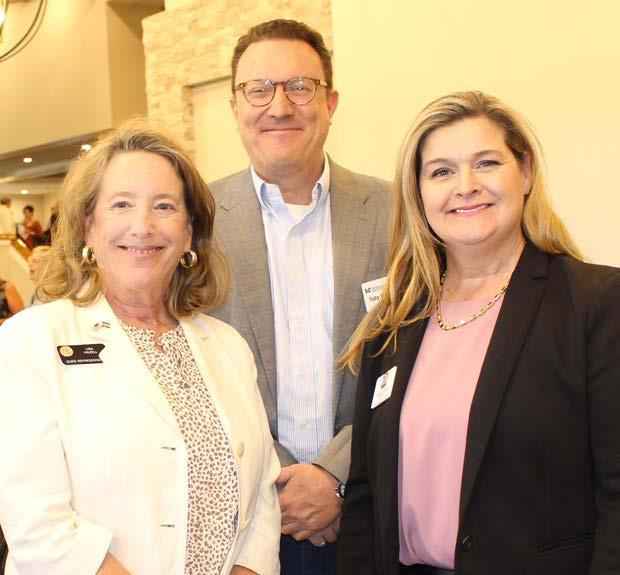
speakers State

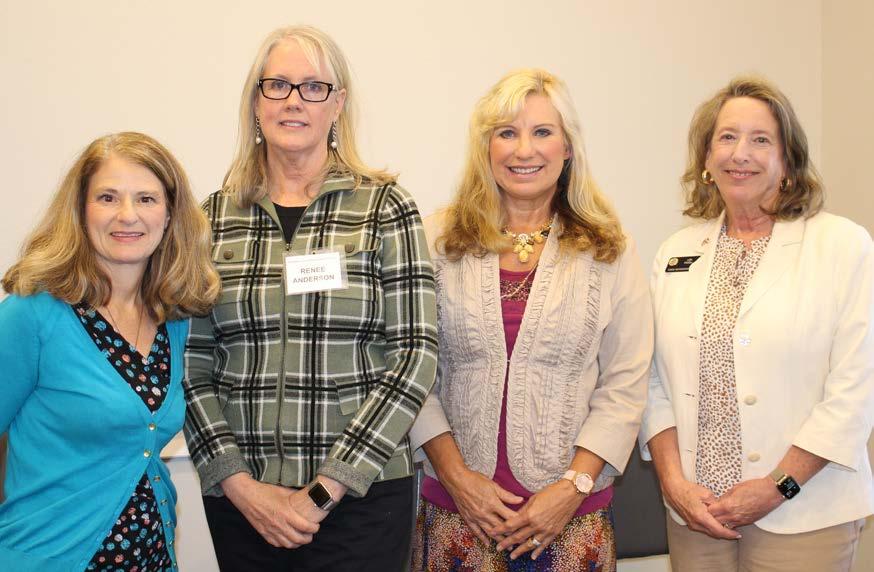

Billed as “A Live Debate like you’ve never seen,” professional actors from Philadelphia’s American Historical Theater portrayed Alexander Hamilton and Thomas Jefferson on stage taking questions from the audience after. It was non-partisan evening with big government vs. small government – entertaining and mesmerizing.
From Hamilton: “Why has government been instituted at all? Because the passions of men will not conform to the dictates of reason and justice, without constraint.” From Jefferson: “The people are the only sensors of their governors; and even their errors will tend to keep those in the true principles of their institution.”
Constituting America’s mission is to utilize the culture and multi-media outreach such as music, film, internet and social media to educate, engage and inspire America’s adults and students about the importance of the U.S. constitution and the foundation it sets forth regarding our freedoms and our rights.


Actor Steve Edenbo (Thomas Jefferson), CEO and CoFounder of Constituting America Cathy Gillespie, Colorado Coordinator and Education Specialist Jill Cullis, Actor Eben Kuhns
“The Debate was an extraordinary success with 450 people in attendance wanting to learn about our Founding Fathers, their beliefs about government, our great nation, our founding documents – Declaration of Independence and our beloved Constitution.”
- Jill Cullis
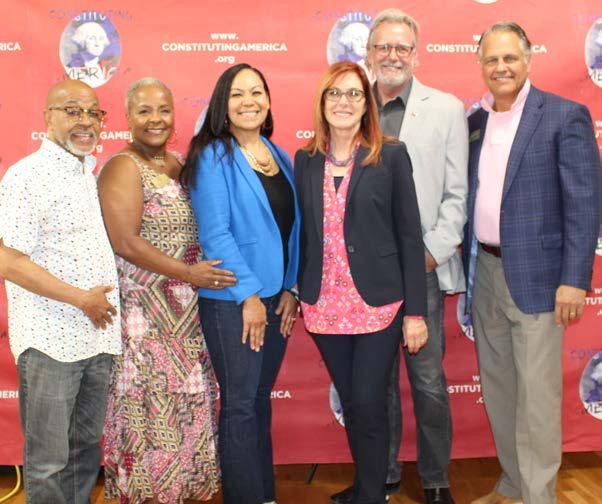

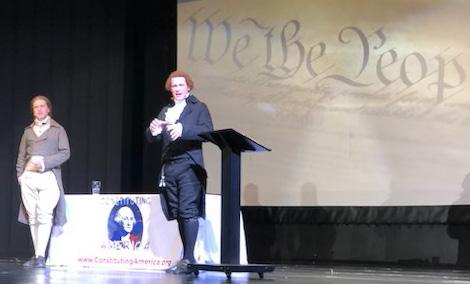

By Presenting Sponsor Local Hive... Passed hors d’oeuvres, dinner, layers of entertainment, Emcee Chris Parente in butterfly cape, silent and live auctions, best dressed competition, fashion show apparel inspired by butterflies from Rocky Mountain College of Art + Design, awards and so much more!
Butterfly Ball is Colorado’s biggest night of conservation! 97% of all animal species are invertebrates and they are declining affecting generations to come. Butterfly Pavilion’s commitment is guided by the principals of People. Planet. Promise. For more information: www.butter flies.org.




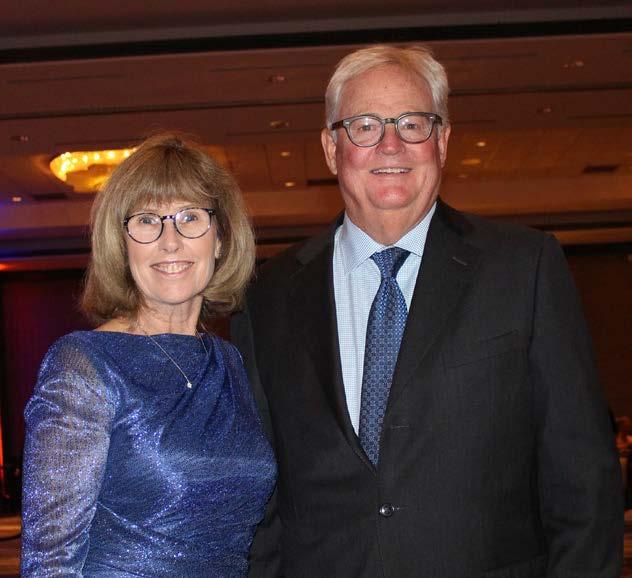




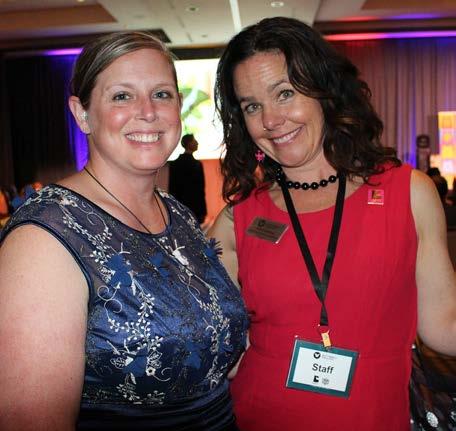



Shortly before this year’s baseball regular season ended, someone asked me if I thought Bud Black would be back as manager of the Rockies in 2025.
I gave them two reasons why I thought he would:
1. Owner Dick Monfort is loyal to a fault; he never lets anyone go if he can avoid it.
2. Bud thinks the team is turning a corner with young talent; he wants to be a part of it.
playoff teams raises a question.
The four clubs with the youngest rosters—Detroit, Kansas City, Baltimore and Cleveland—all have managers 51 or younger.
long gone.
Detroit called it “pitching chaos.” But however a team chooses to describe its use of a deep bullpen, the bottom line is “deep bullpen.”


While the four League Division Series were playing out, the Rockies made it official, signing Black to a oneyear contract.
So, the question now is not, Will he return? But rather, Should he?
In their announcement that Black would return for his ninth season in 2025, the Rockies made it a point to remind everyone that he is the winningest manager in team history.
But that’s not saying a lot. He surpassed Clint Hurdle’s 534 victories with his 535th on September 17 and finished 2024 with 537.
Against 657 defeats.
And while he has the most victories, Bud’s not the most successful skipper ever to wear the purple pinstripes. Don Baylor has the highest winning percentage at .484, with 440 victories to 469 losses. Buddy Bell is second at .465.
Black got off to a flying start after he succeeded Walt Weiss before the 2017 season, leading Colorado into the postseason in back-to-back years and compiling a 178147 record.
But since then, his teams are 359-510, including backto-back seasons with a combined 204 losses.
It’s not all his fault, of course. Significant injuries (particularly to the pitching staff), bad trades, poor free agent decisions and over-estimated talent levels on some young prospects have all contributed to the disappointing results of the last six years.
But is Black, at 69, the right man to lead the youth movement on which the Rockies are embarking?
The Rockies think so.
“We believe the foundation we’re building with our core roster and our farm system, along with Buddy’s skills, experience and knowledge are instrumental in achieving our goal of playing games in October,” general manager Bill Schmidt said in a statement released by the club when announcing Black’s new contract.
A look at this season’s
The Guardians’ Steven Vogt is 39. Is it just a coincidence that four comparatively youthful managers all led young players to the playoffs?
Or did they relate to them in a way that older managers don’t, because of either the age gap or a difference in the way the game is played today compared to when they were much younger?
It is conceivable that the Rockies’ Opening Day batting order next March 27 in Tampa will average less than 26 years of age. And that includes the “old man”—Ryan McMahon, who will be 30 in a couple months.
So, relating to younger players is a must.
Black is well-liked by his players. But is he more like grandpa than a contemporary in his approach to today’s game?
This year’s Wild Card and Division rounds emphasized another point. Post-season baseball has changed.
The days of setting up a pitching rotation so that the ace and his understudy get as many starts as possible are
Which begs this question: Can a former pitcher who excelled during a time when teams relied on their starters to “go deep” adapt to utilizing six or seven pitchers in one game, as A. J. Hinch of the Tigers and many of his counterparts did in this year’s early rounds of the playoffs?
There were signs late this season that the Colorado bullpen might be developing some relievers who could fill roles in such a scenario. Victor Vodnik, Luis Peralta, Seth Halvorsen, Angel Chivilli, Jeff Criswell and Jaden Hill all showed potential. If it happens, Tyler Kinley, 33, can be their wizened anchor.
In Black’s first two seasons, I was among those who thought he really had an impact on the pitching staff. Since then, not so much.
Like it or not, he’s getting another chance to make a difference.
Denny Dressman is a veteran of 43 years in the newspaper business, including 25 at the Rocky Mountain News, where he began as executive sports editor. He is the author of 16 books, nine of them sports-related. You can write to Denny at dennydressman@comcast. net



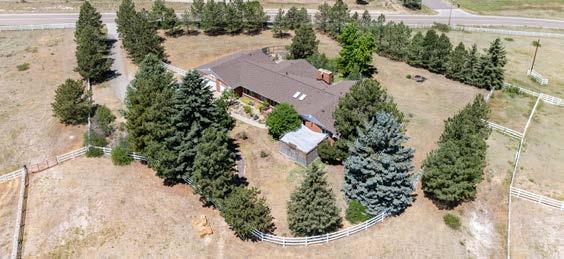

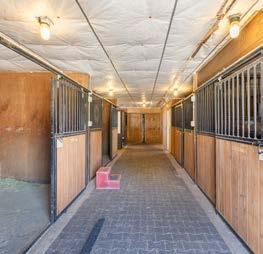





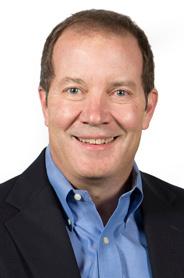
Let’s learn about your roots. Share a bit about where you grew up and your journey to Denver? I am tall, white, but my heart is half Asian. The first sixteen years of my life were in the small island country of Singapore off the southern tip of the Malay peninsula. From Singapore, we moved to Iowa City, Iowa but I always had eyes for the mountains of Colorado. So, in 2002 in response to a call to vocational ministry, I moved to Denver to go to Denver Seminary and currently serve as an Associate pastor at Greenwood Community Church. I consider myself spoiled to work and live in this beautiful state with its majestic mountains.
Denver is known for its unique charm and diverse offerings. What specific elements of life here do you find most enchanting and why? I love the mountains. There is so much you can do in the mountains of Colorado – hiking, camping, paddle boarding, mountain biking, and rock climbing. Particularly I enjoy hiking/climbing Colorado’s fourtneers (mountains above 14,000 ft.). I currently have summited 46 of the 58 14ers in Colorado and hope to get them all done when I am 50. I’m 47, so I only have three more years. Yikes! There is something
ticle, Colorado ranks 21st for population, 15th for GDP and 8th for personal income per resident. On a personal level, I live in the suburbs of Denver with big homes, beautiful lawns, and nice cars. I know many that are successful, have accomplished much, and have traveled widely. From the world’s definition, we have arrived. But as a pastor, I also have seen below the veneer and know that the stuff is often an illusion of comfort and control. Sometimes it is not until a health crisis, a failed marriage, or a tragic loss that someone sees the illusion and starts to ask the deeper questions or pursue the greater causes.
Reflecting on your journey, both personally and professionally, could you share a pivotal moment that left a lasting impression on you? Before I went into ministry, I worked as a civil engineer. I was good at it and found it interesting, but I was not really passionate about it. My soul was unsettled. At the time, I was reading the book ‘Wild at Heart’ by John Eldredge and this line changed everything, “Don’t ask yourself what the world needs, ask yourself what makes you come alive and go do that, because what the world needs is people who have come alive.” Nothing against engineers, the world needs good engineers. But God was awakening my heart for something different. I wanted to walk alongside people and help them experience the depth of God’s heart for them and teach them the way of Jesus.
Family bonds often bring us immense pride. Would you be willing to share a cherished moment or achievement involving your family that holds a special place in your heart?
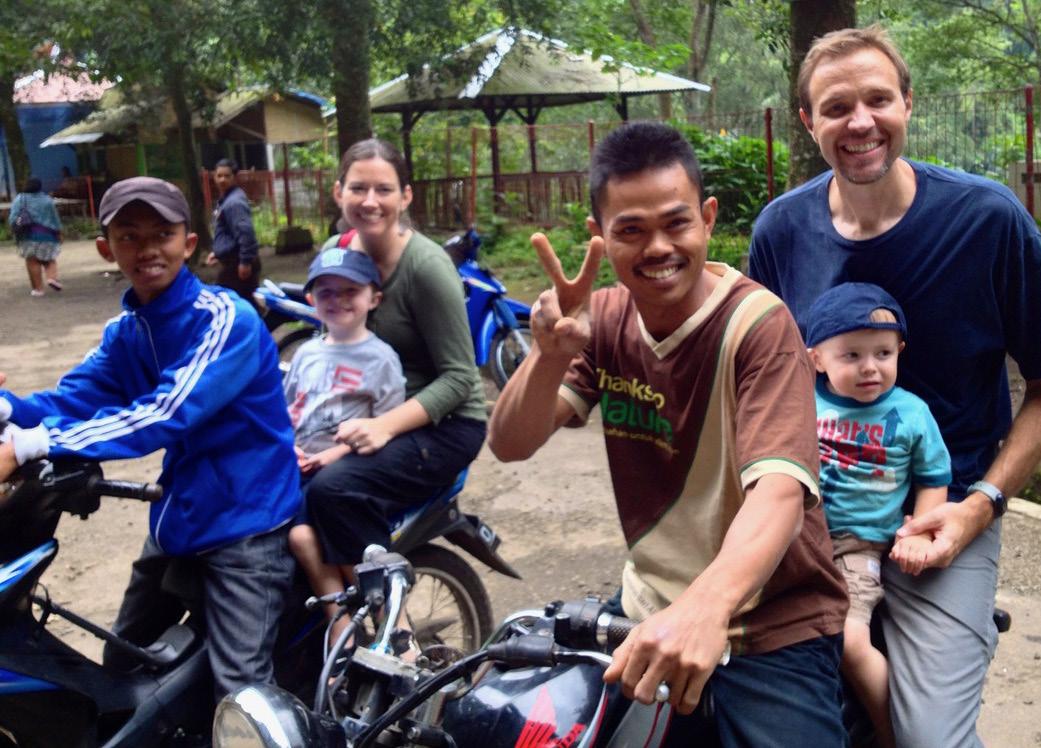
incredible about how far and high you can go into the mountains after a couple hours to get away from the noise, congestion, and busyness of life…and then lose yourself in the beauty of it all.
As a resident deeply connect to Colorado, what do you perceive as the most significant challenge currently facing our state?
The illusion of affluence. In a recent Denver Post ar-
My wife and I with our two boys served with a Christian ministry in Indonesia for three years. We took a year to learn the language and culture, made many of mistakes including calling someone’s baby a cute pig! Thankfully they were gracious. I taught at a Bible College as we lived out our faith in our community. These were one of the hardest years of our lives. It was very challenging having young kids and living in a cross-cultural urban environment with a lot of traffic and pollution. We were reminded by the Biblical story of the boy who brought five loaves and two fish to Jesus to feed the five thousand. We felt like we did not have much to offer but we gave it to God and He thankfully used it in beautiful ways.
Beyond the demands of daily life, what activities or hobbies bring you the greatest joy and fulfillment in your free time?
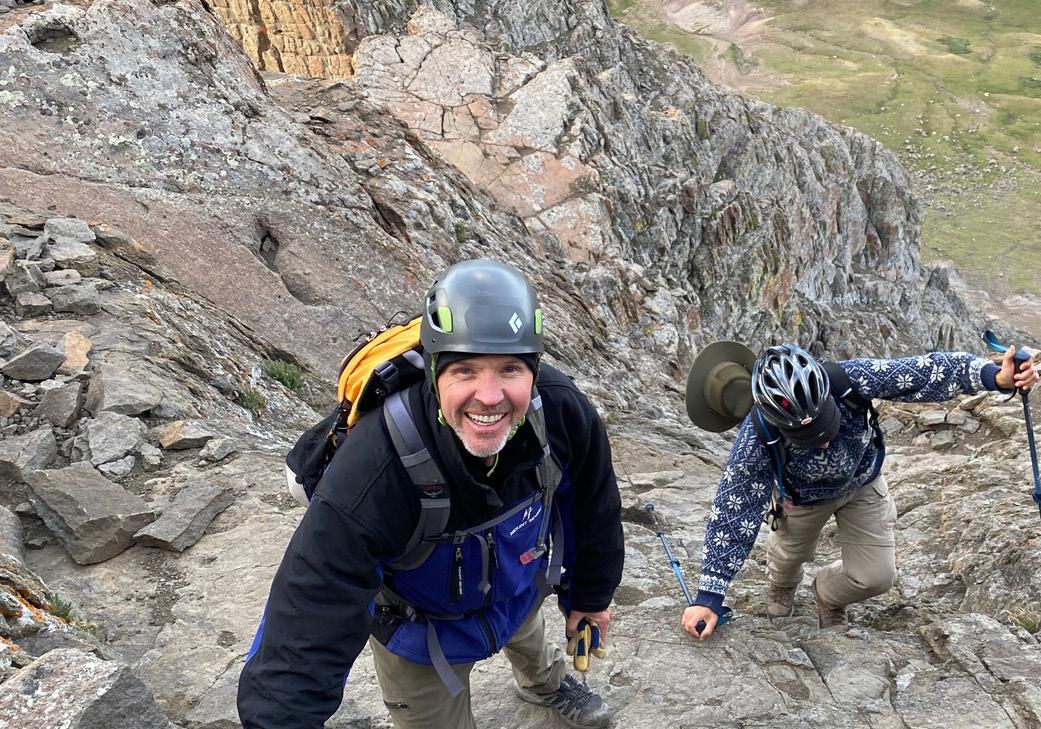


Besides hiking mountains and remodeling our home, I also enjoy reading and my wife and I enjoy hosting parties at our house. Nothing beats a Colorado summer evening on the back deck with good friends.
Denver is a culinary melting pot. Could recommend one or two restaurants that hold a special place in your heart?
I am often on the hunt for good southeast Asian food. I might be biased but I think they have the best flavors in the world. And yet it is hard to find good southeast Asian restaurants in

Denver. The best one we have found is Jaya Asian Grill on Colorado and I-25.
As we conclude, could you share with us a favorite quote or mantra that serves as a guiding light in your life or encapsulates your outlook on the world?
The words of Jesus, “Are you tried? Worn out? Burned out on religion? Come to me. Get away with me and you’ll recover your life. I’ll show you how to take real rest. Walk with me and work with me – watch how I do it. Learn the unforced rhythms of grace. I won’t lay anything heavy or ill-fitting on you. Keep company with me and you’ll learn to live freely and lightly.” Matthew 11:28-30 MSG
Traveling in Italy for the last few months has been relaxing, educational, and amazing. I am overwhelmed with gratitude to be able to take this once-in-a-lifetime trip. As Fall is in full swing, I am reminded that the holidays are approaching. Returning Stateside in early December, I am considering how we will operationalize the Christmas season. Since we continue looking for our downsized home after selling our house in Greenwood Village in June, I am considering where we will gather for Christmas. What traditions will we keep, and what new ones will we develop? How will we share the time between biological parents and stepparents?

be daunting. Will everyone get along? How will we celebrate the holiday with the older grandchildren on my husband’s side, as some of them are home from college for a couple of weeks? Where will people sit for dinner? Should the older children sit at the children’s table? Should we feed them first so they can play while the adults enjoy their dinner?
Even for the most happily married couples, the holidays can be complicated and fraught with conflict and compromise. It is exponentially more tangled for parents and grandparents trying to walk the tightrope of pleasing everyone and making memories in a blended family.
Blended families, even with adult children with children of their own, can
This year, we will attempt to plan well. The food will be plentiful, with items that chil-
dren and adults enjoy. After going through the abundance of choices on the buffet, we will set several tables so individuals, families, siblings, cousins, and stepchildren can arrange where they want to sit.
Since there is a diversity of thought and even some animus regarding politics or religious traditions, we will make a pact to keep these discussions limited or off-limits. We need to try to maintain relationships rather than being right. One of the strategies to keep stress low and connection high is not to be offended or sensitive about inartful or harsh comments that could be misinterpreted. We must remember that there is no guile in anyone, and we should seek to be graceful and forgiving with one another. We expect everyone to act emotionally restrained, mature, and kind, making the time together
peaceful and calm. We will continue trying new ways to connect with our growing blended family, working hard to make them memorable and magical with so many moving parts.
Divorce is never easy; the ensuing challenges continue long after the breakup. When remarriage occurs, life gets complicated when children are on both sides. In addition, spouses of adult children and grandchildren are on each side. Creating a new tribe and developing new rules, traditions, and memories is challenging. The tribe we created is a delight filled with diversity, grace, and patience. This did not happen by chance. It was done with love, kindness, and intentionality. Every holiday, I am thankful for the foundation built to create our new family rhythms, traditions, and celebrations. Happy Fall! joneen@narme.org
October 25 - 27 9 am - 4 pm
Dress to impress in your favorite costume and enjoy some fabulous fall activities like Monster Carnival games, meet & greets with live creatures, boo-tiful crafts, special themed StoryTimes and so much more!
Event day pricing applies, members are free.



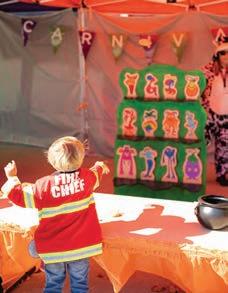
It’s hard for me to admit this, but I once wrote political commercials. Don’t judge me. It was while I was working at a smalltown radio station and I only wrote ads for local politicians. They preferred to focus on their own positives rather than the negatives of their opposition. That was lucky for me because I don’t like to say mean things about other people—unless I’m sure they won’t hear me. That probably defeats the purpose of advertising.

I could never make it in the nasty world of national political copywriting. Those copywriters are not the sort of people you want to get on the wrong side of.
They can somehow track down the most unflattering photos and videos ever taken of their opposition and use them in commercials for the whole country to see. Maybe the candidate sneezed or yawned as the photo was taken. Or they tripped stepping off a curb and someone caught it on video. Back in my copywriting days, I would never have felt comfortable showing someone at their worst like that. I’m just too nice. Plus I was working in radio. The creators of negative TV ads also scour the internet for the dumbest things the opposition has said and done since fifth grade. I couldn’t do that either. I’ve done
one or two dumb things myself and I was as empathetic back in my copywriting days as I am now. Also the internet hadn’t been invented yet.
I admit that I have been known to indulge in name calling, something political copywriters excel at. Unlike them though, I only do it when I’m sure my target can’t hear me. Occasionally I may call someone something that can’t be printed in this newspaper, but only when I’m reading the news. Or listening to it. Or driving. Political copywriters are willing to do their name calling publicly and they have at their command a far more sophisticated and lengthier list of names than I have: extremist, radical, barbarian, Neanderthal and so on. Actually I haven’t heard anyone
called a Neanderthal in a political commercial—yet. But there’s still time before the election. And here’s another thing that would be hard for me about writing political ads for TV: lying. Not only is it legal to lie in political advertising, it seems to be encouraged, at least by the people paying for the advertising. And I cannot tell a lie. Okay, I can. But I try not to very often because I don’t feel good about it after I do it.
The courts have upheld the First Amendment right of candidates to say pretty much whatever they want on federally regulated broadcast channels. That means TV commercials may be every bit as fictionalized as the TV programming they interrupt, but not nearly as entertaining.
Of course, there are positive political ads too. I could write those. They show candidates all spiffed up and smiling after a good night’s sleep. The ad’s creator sprinkles all sorts of pretty words in the ad, like freedom, liberty and leadership. Then they add some sweet photos or video, maybe of the politician with a small child or a puppy. This is meant to show their candidate’s human side. As a former copywriter, I think this is a smart strategy since all the negative ads we’ve seen from their side might have left us wondering if they have one.
Dorothy Rosby is an author and humor columnist whose work appears regularly in publications in the West and Midwest. You can subscribe to her blog at www. dorothyrosby.com or contact at www.dorothyrosby.com/contact.
Because the public has a right to know

1st place - 2018, 2nd place - 2023
Div./Ctrm.: 15
DISTRICT COURT
ARAPAHOE COUNTY, COLORADO
Arapahoe County Justice Center
7325 S. Potomac St., Centennial, CO 80112
THE PEOPLE OF THE STATE OF COLORADO, Petitioner - Plaintiff,
v. Justo Ventura-Gutierrez, and any unknown persons who may claim any interest in the subject matter of this action, to wit: 2004 Gray Lexus (VIN JTJHA31U440032780) and $3,005 in United States Currency, Respondent - Defendant
Case Number: 24CV030557
CITATION TO SHOW CAUSE WHY CONTRABAND PROPERTY SHOULD NOT BE FORFEITED
THIS MATTER comes before the court pursuant to §16-13-501, et seq., C.R.S., as a Petition in Forfeiture seeking a Citation to Show Cause Why Contraband Property Should Not Be Forfeited, brought by the District Attorney for the Eighteenth Judicial District, State of Colorado.
The Court has examined the Petition and the supporting affidavit and has considered the PetitionerPlaintiff’s request for the issuance of a Citation to Show Cause.
The Court is satisfied that the Petitioner-Plaintiff has shown probable cause that the seized
property in this action, as described in the caption above, is contraband property subject to seizure, confiscation, and forfeiture pursuant to §16-13-501, et seq., C.R.S. The Court finds that the named RespondentDefendant in the caption is the only person known to have, an interest in, or to have asserted and interest in, the subject matter of the action.
The Court, therefore, issues this citation:
THE PEOPLE OF THE STATE OF COLORADO
TO THE ABOVE RESPONDENTDEFENDANT:
YOU ARE HEREBY SUMMONED AND ORDERED TO APPEAR for a first appearance on this case in the District Court in and for the Eighteenth Judicial District, State of Colorado, at the Arapahoe County Justice Center, Division 15, 7325 S. Potomac St., Centennial, State of Colorado, on
the 24th day of October, 2024, at 10:00 a.m., and to show cause, if any there be, why the court should not grant the relief requested in the Petition in Forfeiture served herewith, which seeks the forfeiture of the subject matter property described in the caption above, which was seized on the date of January 24, 2023, at or near the location, Arapahoe State of Colorado. The Arapahoe County Sheriff’s Office is the agency holding the seized subject matter property.
The Court orders that this citation may be served by certified mail, in accordance with §16-13-505(7,) C.R.S.
WARNING: If you wish to have the subject property returned to you, you must respond to this Citation to Show Cause. You are warned that, pursuant to §1613-505(1.7)(b) and (8), C.R.S., if you fail to file a response to the Petition in Forfeiture and in accordance with §16-13-505(2)(d), or if you fail to appear person-

1st place - 2018
ally, by counsel, or as otherwise directed by the Court at the first appearance, pursuant to §1613-505(8), C.R.S., judgment by default shall be entered against you by the Court forthwith for the relief demand in the Petition in Forfeiture, without further notice.
Pursuant to §16-13-505(2)(d), C.R.S., the responsive pleading shall be designated a response to petition and citation to show cause and shall be filed with the court at or before the first appearance on the petition and shall include:
(I) A statement admitting or denying the averments of the petition;
(II) A statement setting forth with particularity why the seized property should not be forfeited. The statement shall include specific factual and legal grounds supporting it and any affirmative defense to forfeiture as provided in this part 5.
(III) A list of witnesses whom the respondent intends to call at the hearing on the merits, including the
addresses and telephone numbers thereof; and
(IV) A verified statement, supported by documentation, that the claimant is the true owner of the property or an interest therein.
You are advised that, pursuant to §16-13-505(5) C.R.S.: “Continuance of the hearing on the merits shall be granted upon stipulation of the parties or upon good cause shown.”
DONE
where same is open for public inspection. That such proposed budget will be considered at the meeting of the City of Cherry Hills Village Sanitation District to be held at the Cherry Hills Village Center at 2450 E. Quincy Avenue, Cherry Hills Village, Colorado on Monday, November 11, 2024, at 6:30 p.m.
Any interested elector within such City of Cherry Hills Village Sanitation District may inspect the proposed budget and file and register any objections thereto at any time prior to the final adoption of the proposed budget.
Published in The Villager
Published: October 17, 2024 Legal # 11604
NOTICE AS TO PROPOSED 2025 BUDGET AND AMENDMENT OF 2024 BUDGET
CHERRY CREEK CORPORATE CENTER METROPOLITAN DISTRICT CITY OF GLENDALE, ARAPAHOE COUNTY, COLORADO
NOTICE IS HEREBY GIVEN, pursuant to Sections 29-1-108 and 109, C.R.S., that a proposed budget has been submitted to the Board of Directors of the Cherry Creek Corporate Center Metropolitan District (the “District”) for the ensuing year of 2025. The necessity may also arise for the amendment of the 2024 budget of the District. Copies of the proposed 2025 budget and 2024 amended budget (if appropriate) are on file in the office of the District’s Accountant, Simmons & Wheeler, P.C., 304 Inverness Way South, Suite 490, Englewood, CO 80112, where same are available for public inspection. Such proposed 2025 budget and 2024 amended budget will be considered at a special meeting to be held on Tuesday, October 22, 2024 at 1:00 p.m.
1.To attend via Zoom videoconference, use the following link, or e-mail
csorensen@specialdistrictlaw.com to have the link e-mailed to you: https:// us02web.zoom.us/j/81392557250?pwd=oQWtda6Cy8RTTPJCGjYTzgtW4 q8B1k.1
2. ....To attend via telephone, dial 1-719-359-4580 or 1-253-215-8782 and enter the following additional information: (a) ............................................................Meeting ID: 813 9255 7250 (b) .........................................................................Passcode: 737951
Any interested elector within the District may, at any time prior to the final adoption of the 2025 budget or the 2024 amended budget, inspect the 2025 budget and the 2024 amended budget and file or register any objections thereto.
CHERRY CREEK CORPORATE CENTER METROPOLITAN DISTRICT /s/ Elisabeth A. Cortese McGEADY BECHER CORTESE WILLIAMS P.C. Attorneys for the District
Published in The Villager Published: October 17, 2024 Legal # 11605
NOTICE OF VACANCY
PURSUANT to Section 32-1-808(2)(a)(I), C.R.S., notice is hereby given that a vacancy does exist on the Board of Directors of Heritage Greens Metropolitan District. The Board of the Districts may fill said vacancy 10 days after the date hereof.
By:Lisa Mayers Legal Counsel
Published in The Villager
Published: October 17, 2024 Legal # 11606
REINKE BROTHERS HAUNTED MANSION TOUR
NOW-NOV. 3. Haunted House open 7 days per week. Check Todays Villager for hours of operation. Lights On Kid’s Tour: Sat. & Sun. 10 a.m. - 1 p.m. Children’s tour only
$12. Other tickets $20-$35. 1.5 Million Dollars in costumes of all Kinds at Reinke Brothers. Tickets: 303-795-5006 or online at reinkebrothers.com and at the box office. Reinke Brothers is located in Downtown Littleton, 5663 S. Prince St.
4TH ANNUAL MAGIC OF THE JACK O’LANTERNS ILLUMINATES HUDSON GARDENS
NOW-NOV. 2. More than 7,000 pumpkins on select nights. Walk through a glowing trail of thousands of magnificent, can-carved pumpkins. For a unique optical experience, 3-D glasses are available for purchase. Food trucks, S’mores stations, drink stations. Tickets: magicofthejackolanters.com.
MUSEUM OF OUTDOOR ARTS - MARJORIE PARK UNCORKED FREE HALLOWEEN MOVIE NIGHTS
OCT. 18 - ADULT NIGHT - THE ROCKY HORROR PICTURE SHOW. OCT. 19 FAMILY NIGHT - Scan QR Code in todays advertisement to RSVP.
HUNTINGTON’S DISEASE SOCIETY OF AMERICA 2024 EDUCATION DAY
SAT., OCT. 19, 10 a.m. at the Univ. of Colorado - Anschutz Medical Campus. Visit www .hdsa.osrg
OPENING RECEPTION FOR “ETHEREAL ESSENCE” AT VALKARIE GALLERY
SAT. OCT. 19, 5-8:30pm The opening reception for “Ethereal Essence” at Valkarie Gallery, 445 S. Saulsbury St. in Lakewood. Visitors are welcome to visit the show through November 10 during regular gallery hours, Wednesdays 4-7., Thursdays 4-9:30, Fridays 4-8:30, Saturdays Noon-6 and Sundays Noon-5. www.artofjanefalkenberg. com
ARAPAHOE COUNTY TREAT STREET
OCT. 19, 20 FROM 11 a.m. - 4 p.m. Safe and festive family fun, held outdoors at the BOOOO-tiful Arapahoe County Scaregrounds in Aurora. Online presale tickets are $10 each. Children 2 and under FREE. Tickets at arapahoecountyeventcenter.com
ALUMNI ASSOCIATIONCOLORADO STATE UNIVERSITY
- 50 YEAR CLUB CELEBRATION
FRI., OCT. 25, 10:30 a.m. pre-reception; 11:45-1 p.m. Luncheon & Awards Program, Hilton Fort Collins, 425 W. Prospect Rd., Fort
Collins. The class of ’74 will be inducted into the 50 Year Club. Award Winners: Career Achievement Award: Dr. Vijay Singh, ’74 and Public Service Award: Susan Campbell ’73. Registration: 800-286-2586.
COLORADO BUSINESS
ROUNDTABLE VIEW FROM THE TOP: INNOVATION IN THE FACE OF UNCERTAINTY.
OCT. 23, 7:30-9:00 a.m. at the Denver Museum of Nature an Science. Featured Speakers: Bryan Leach, Founder & CEO, Ibotta; Ron Lopez, Pres., Astroscale U.S. Inc. and Anne Noonan, Pres. & CEO, Summit Materials. This event unites CEOs from America’s largest and most innovative companies to tackle the theme of “Innovation in the Face of Uncertainty.” Leaders from aerospace, consumer technology, and construction materials will share how they drive technological advancements, boost operational efficiencies, and foster resilience amidst rapid change. Tickets: events@cobrt.com Colorado Business Roundtable is located at 62925 Greenwood Plaza Blvd, Suite 100 in Greenwood Village.
TIMELY DISCUSSION ON RUSSIA BY THREE FASCINATING PANELISTS AND EXPERT MODERATOR
THUR., OCT. 24, 10 AM to noon, Three Fountains Clubhouse, 3280 South Oneida Way, panel discussion: “When AmericanRussian Relations were Good--Before Things Went So Wrong.” Judge Sidney Brooks will describe his training of Russian and Ukrainian judges in the 1990s and early 21st century. Phil Seawalt (a CHV resident) will describe his 18-year-long building and real estate operations in Moscow and Odessa during the 1990s and early 21st century. Tom Conroy will discuss his work to establish a branch of ING Bank in Russia in the 1990s and his work in the early 21st century as CFO of Teton Oil that drilled in Siberia. Mary Schaeffer Conroy, Emeritus Professor, Russian History, University of Colorado, Denver, will serve as moderator . Welcome To Colorado is sponsoring this event. Registration, with a check of $15.00 made out to WTC, should be sent to Anne Cucchi, 15898 West Ellsworth Drive, Golden, CO 80401. For information: Mary Conroy 720.236.5392
CHILDREN’S MUSEUM OF DENVER SPOOK-TACULAR WONDERLAND
FRIDAY-SUNDAY, OCT. 25-27
Children’s Museum of Denver at Marsico Campus. Monster carnival games, meet & greets with live creatures (days & times vary) boo-tiful crafts, story times, teaching kitchen, rides on the Rocky Mtn. Mini Train - (cash only).
SIP IN CENTENNIAL SAT., OCT. 26, 1-5:00 p.m. Centennial
Center Park (13050 E. Peakview Ave. Adulttasting celebration featuring breweries, distilleries and wineries. Live music and food trucks. Admission free. Tasting cards S$20 in advance & $30 day of the event. Visit centennial.gov/events
BABI YAR VIRTUAL COMMEMORATION
OCT. 28, 5:30 p.m. Featuring a special address by Phil Weiser, Colorado Attorney General - The Courage to Bear Witness: Standing Together to Create Bonds of Humanity and a moving tribute concert by Sandra Wong - World-Renowned Concert Violinist. Can’t make it? Registrants will be sent a replay link www.MizelMuseum.org
EASTERSEALS COLORADO
14TH ANNUAL SEASON OF LIGHTS GALA
NOV. 9, 6-10 p.m., Hyatt Regency Tech Center. Honoring Holland & Hart and Iron Pony Express with the Jake Jabs CommunityImpact Award. 1950s rock n’roll theme. Call 303-667-5393.
GLOBAL DOWN SYNDROME FOUNDATION “BE BEAUTIFUL BE YOURSELF FASHION SHOW
NOV. 16, 5 p.m. Zaya Biel honored as Global Ambassador and Quincy Jones Exceptional Advocacy Awardees, Sofia Sanchez and Woody Harrelson. Questions: 303-321-6277. Sheraton Denver Downtown Hotel.
48TH ANNUAL L’ESPRIT de NOËL HOLIDAY HOME TOUR
BENEFITING CENTRAL CITY OPERA GUILD
NOV. 22 & 23 10 a.m.- 4 p.m. each day. Home tour in Crestmoor Park Neighborhood of Denver. Non-Guild Member Tickets $50, Guild Member Tickets $40. Purchase tickets at www.lespritdenoel.org/buy-tickets
FACES OF JFS COMMITTED TO COMMUNITY
WED., DEC. 4, 5:30-9:30 p.m. The Cable Center, adjacent to the Univ. of Denver campus. Program to honor Dr. Richard Sanders with the Yana Vishnitsky Leadership Award and Dr. Nancy Reichman with the Joyce and Cal Zell Humanitarian award. Tickets: jewishfamilyservice.org/faces
SOUTH SUBURBAN GOLF
COURSE 50TH ANNIVERSARY
7900 S Colo. Blvd., Centennial. Five leagues have joined together to raise funds for “Nourish Meals on Wheels” this month. Nourish delivered more than 200,000 meals and groceries in 2023 to those in need. Concerts and karaoke nights throughout the year. Info: 303-70-5500.
DENVER LIONS CLUB MEETINGS


DIRECTV PORTABLE OXYGEN
Portable Oxygen Concentrator May be Covered by Medicare! Reclaim independence and mobility with the compact design and long-lasting battery of Inogen One. Free Information Kit! Call: 844-823-0293
Meets 2nd & 4th Tuesdays at 12 noon at the American Legion Hall, I-25 & Yale. Interested in joining? Call Bob, 720-313-9741.
ENGLEWOOD LIONS CLUB MEETINGS
Meets 1st & 3rd Thursdays at 7:00 p/m. At Mango Tree Coffee, 3498 S. Broadway,Englewood. Info: Gail 720-3777682.
WHAT’S NEW?
ST. ANDREW’S VILLAGE SENIOR LIVING EVENTS
Upscale dining, engaging events and activities, indoor pool, pet friendly. Call 72-684-5913 to schedule a tour and enjoy lunch on the Village. Located at 133801 E. Yale Ave., Aurora.
The Colorado Public Utilities Commission designated CenturyLink as an Eligible Telecommunications Carrier within its service area for universal service purposes. CenturyLink’s basic local service rates for residential voice lines are $34.00 per month and business services are $53.50 per month. Specific rates will be provided upon request. CenturyLink participates in the Lifeline program, which makes residential telephone or qualifying broadband service more affordable to eligible low-income individuals and families. Eligible customers may qualify for Lifeline discounts of $5.25/month for voice or bundled voice service or $9.25/ month for qualifying broadband or broadband bundles. Residents who live on federally recognized Tribal Lands may qualify for additional Tribal benefits if they participate in certain additional federal eligibility programs. The Lifeline discount is available for only one telephone or qualifying broadband service per household, which can be either a wireline or wireless service. Broadband speeds must be at least 25 Mbps download and 3 Mbps upload to qualify.


A household is defined as any individual or group of individuals who live together at the same address and share income and expenses. Services are not transferable, and only eligible consumers may enroll in these programs. Consumers who willfully make false statements to obtain these discounts can be punished by fine or imprisonment and can be barred from these programs.
If you live in a CenturyLink service area, visit https://www.centurylink.com/aboutus/ community/community-development/lifeline. html for additional information about applying for these programs or call 1-800-201-4099 with questions.
